Britain is home to a diverse range of cultures and religions. The country’s foundation is built on immigration and cultural integration. Throughout the year, several events take place that allow people to reconnect with their heritage while also broadening their perspectives on other cultures. Many of these events not only assist to appreciate the diverse range of cultures represented in Britain, but they also help to educate those who attend.
Chinese New Year
The Chinese New Year events in London are the largest outside Asia and attract hundreds of thousands of people each year, with more than 50 teams taking part in creating colourful floats. This one-day festival (that is based in and around Chinatown and London’s West End) hosts a vibrant parade, lion dances, delicious Chinese street food, and free entertainment and stage performances.
It marks the start of the new lunar year, therefore, is set on a different date compared to the Gregorian calendar. The date depends on the Moon which is why the date of Chinese New Year changes each year, however, it will always fall sometime between 21 January and 20 February.
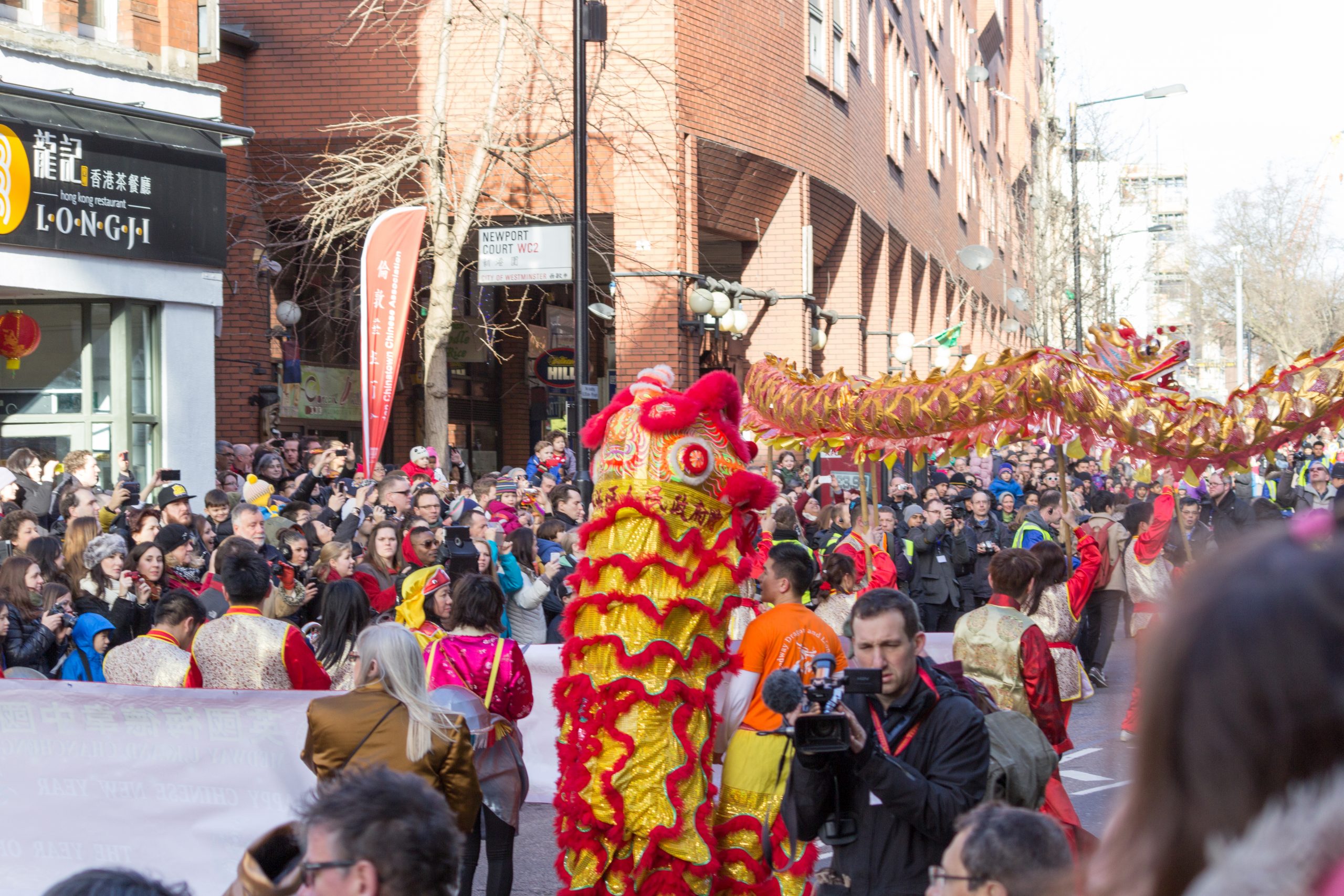
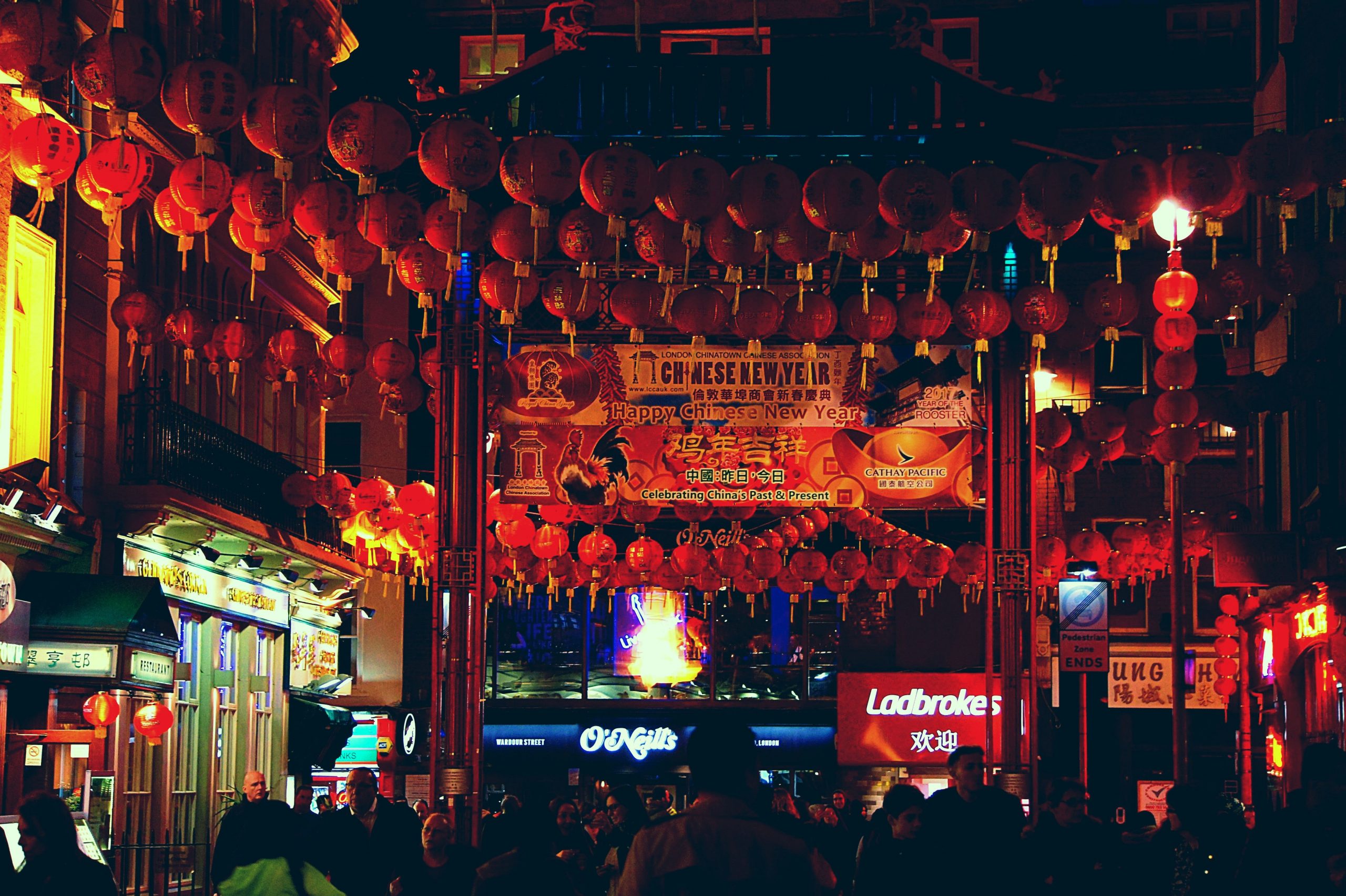
Notting Hill Carnival
The Notting Hill Carnival is a 2-3 day annual Caribbean event that usually takes place on the last weekend of August, on the streets of West London. The carnival is a cultural institution that attracts up to two million attendees and 40,000 volunteers every year. It symbolises the social and political conditions of the post-1948 migration of people from the Caribbean, by celebrating unity and reinforcing social cohesion.
After a series of racially motivated attacks on West Indian residents in West London’s Notting Hill area in August 1958, Trinidadian human rights activist Claudia Jones decided to create a special gathering in an attempt to unify the community. Since 1966, loud music, plenty of street food, spectacular costumes and parade processions have embodied the carnival, making it Europe’s biggest street festival.
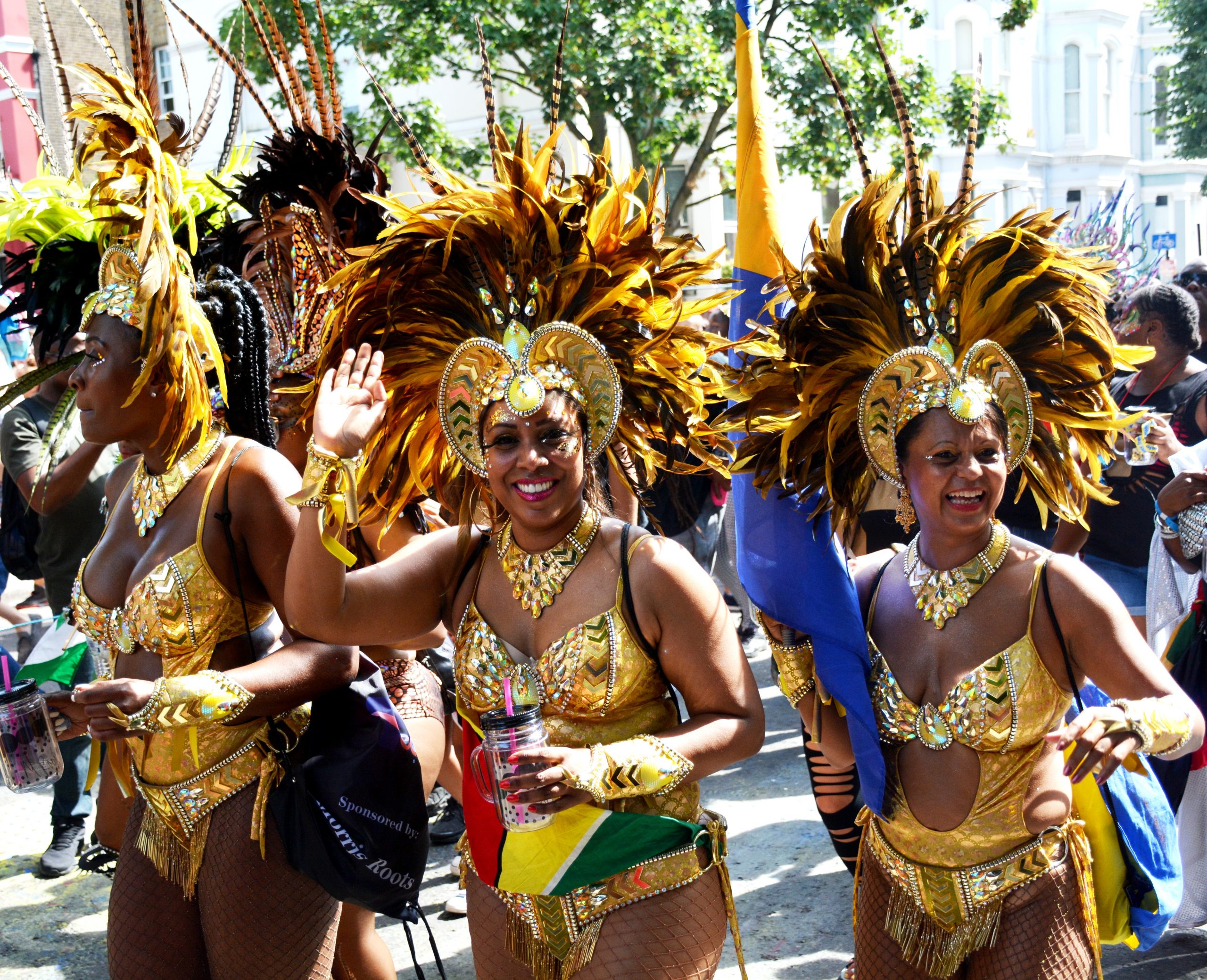
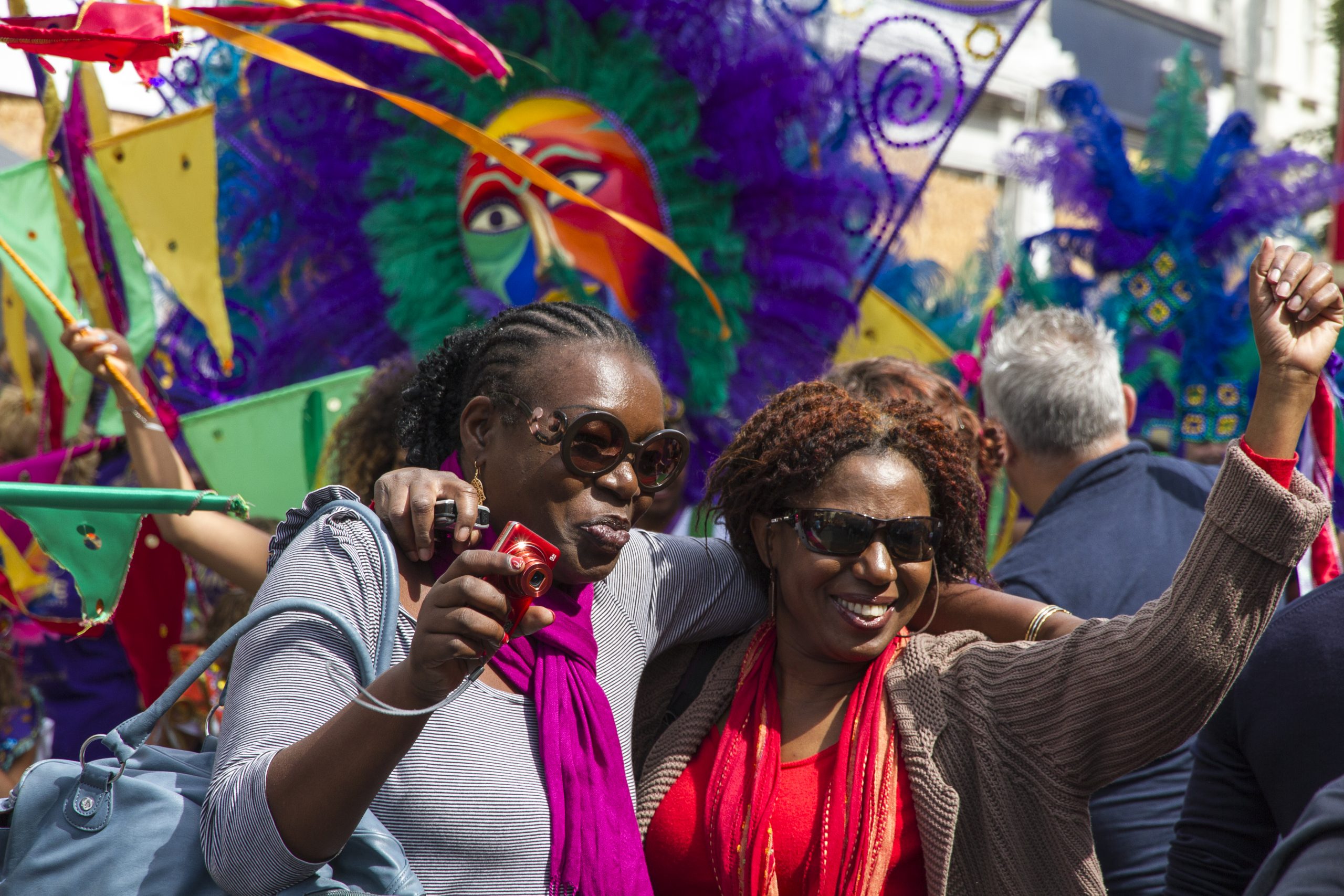
Diwali in Leicester
Diwali is the five-day ‘Festival of Lights’, celebrated by millions of Hindus, Sikhs and Jains across the world. Religious ceremonies, the decoration of homes and temples, time with family and friends, feasting, and exchanging gifts are all part of the festival’s rich social and cultural legacy. The festival is usually between October and November, with the date changing each year.
Diwali in Leicester is recognised as one of the biggest celebrations of the festival of light outside of India. The annual festival in the area of Belgrave has attracted crowds of up to 45,000 in previous years. During the festival crowds enjoy popular, authentic South Asian cuisine and beverages, as shops and restaurants along Belgrave Road stay open into the night.
The festival’s roots can be traced back to the 1950s and 1960s when many Hindus and Sikhs migrated to Leicester after leaving India and East Africa. Many individuals moved to Belgrave due to the city’s inexpensive housing and job opportunities, particularly in the hosiery and garment manufacturing industries. Leicester’s South Asian community expanded considerably in the 1970s, and as a result, the city’s Diwali festivities grew as well. Subsequently, the first public Diwali light display in Leicester took place in 1983, with the lights being turned on by the oldest resident of the South Asian community at the time. The celebrations now mark a new era, a stronger community, and a greater desire to create a festival with international acclaim.
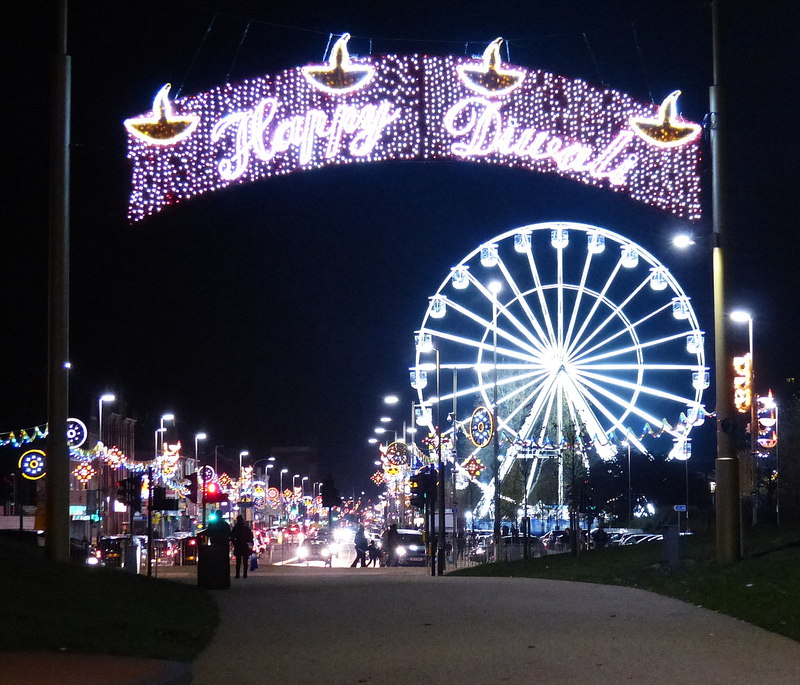
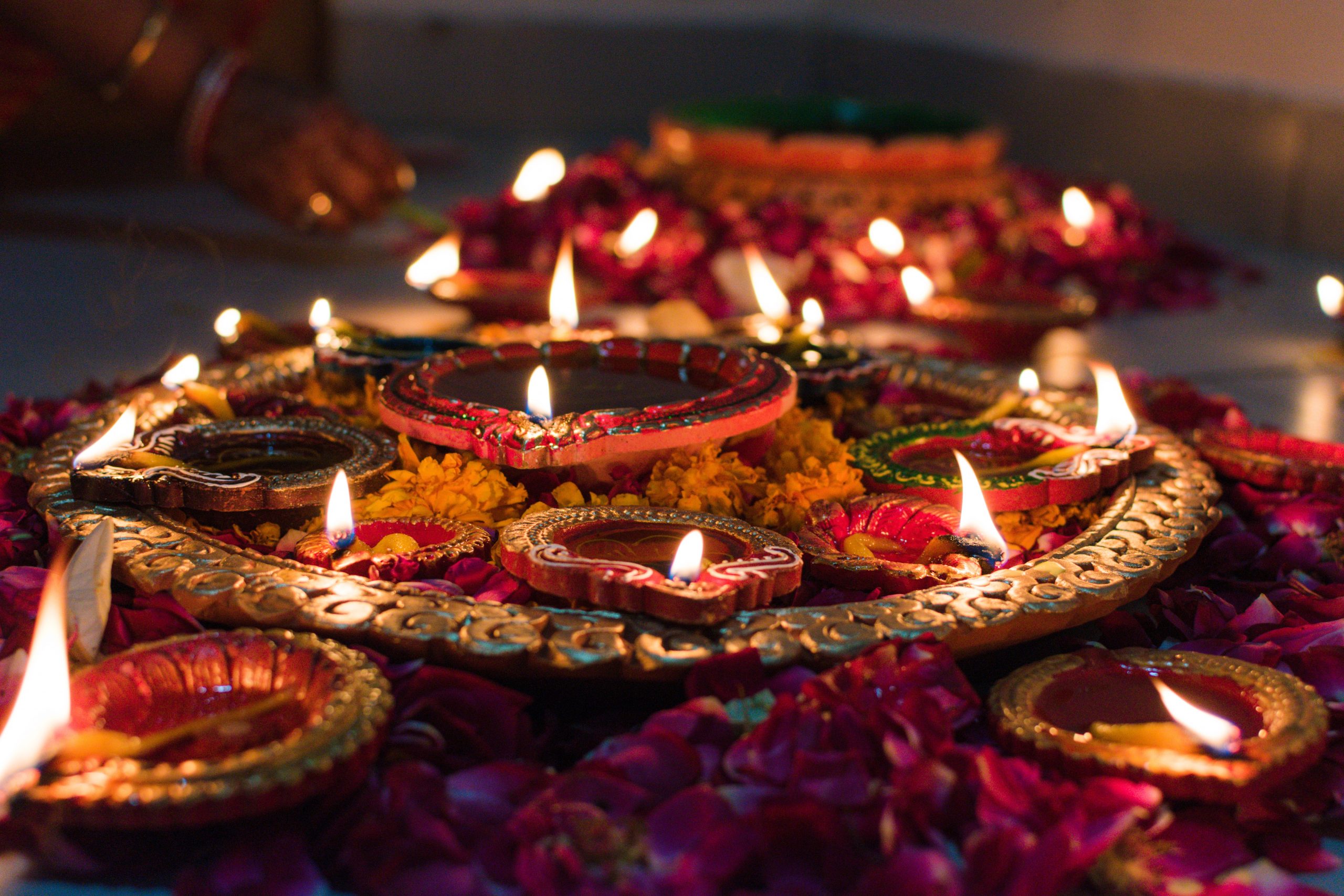
Naija in the Park
Naija in the Park is an open-air annual celebration featuring cultural performances, arts and crafts, an African market, children’s activities, competitions, Nigerian Food, DJs, artists and live music from Nigeria. The festival aims to provide a cultural, educational and business networking platform for Nigerians and friends of Nigeria in the UK. It takes place in Finsbury Park, London, usually at the beginning of August. The event aims to reinforce community cohesion and development through arts and culture. The festival is known to be a good way for people to learn more about Nigerian culture and its influence on many parts of the city.
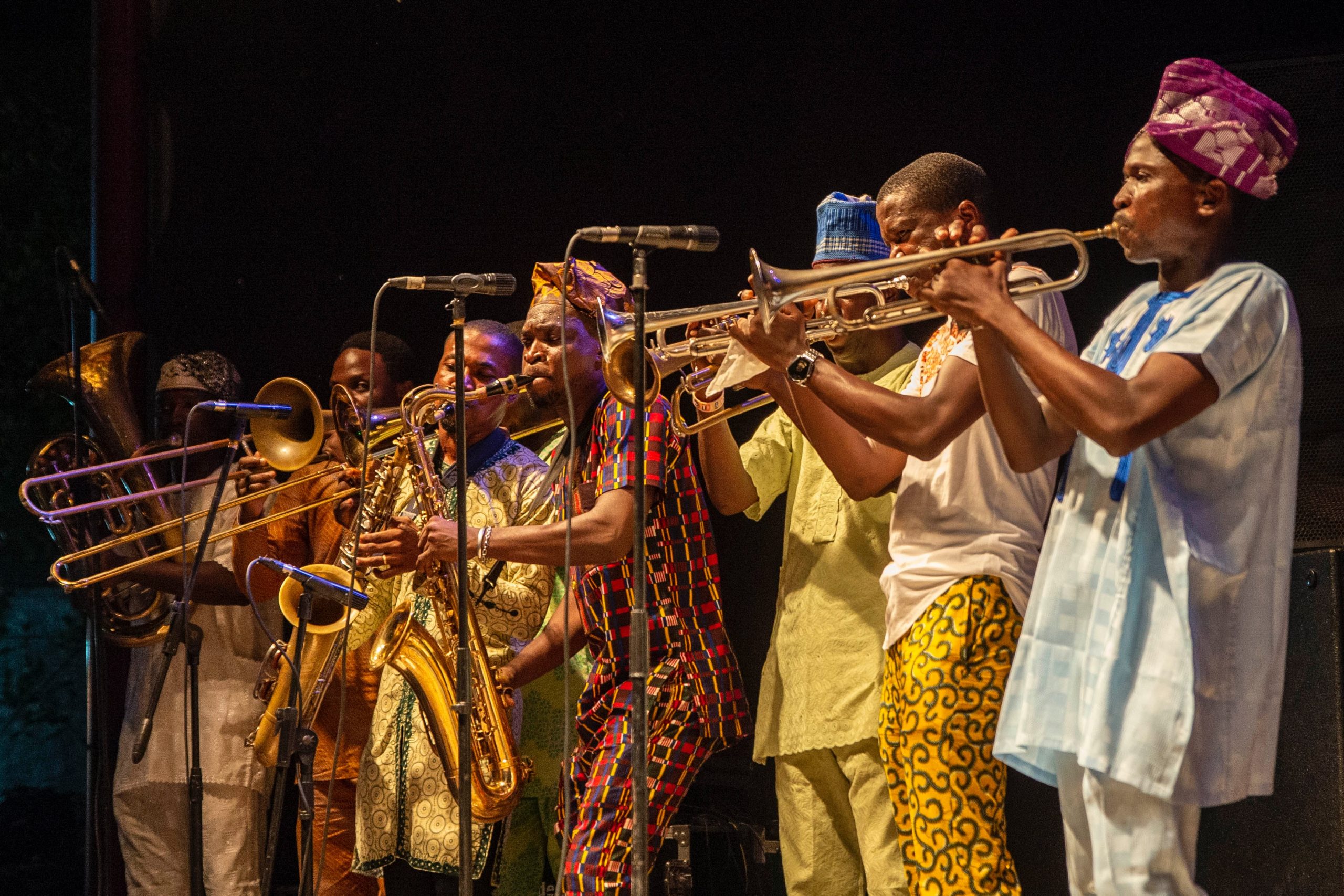
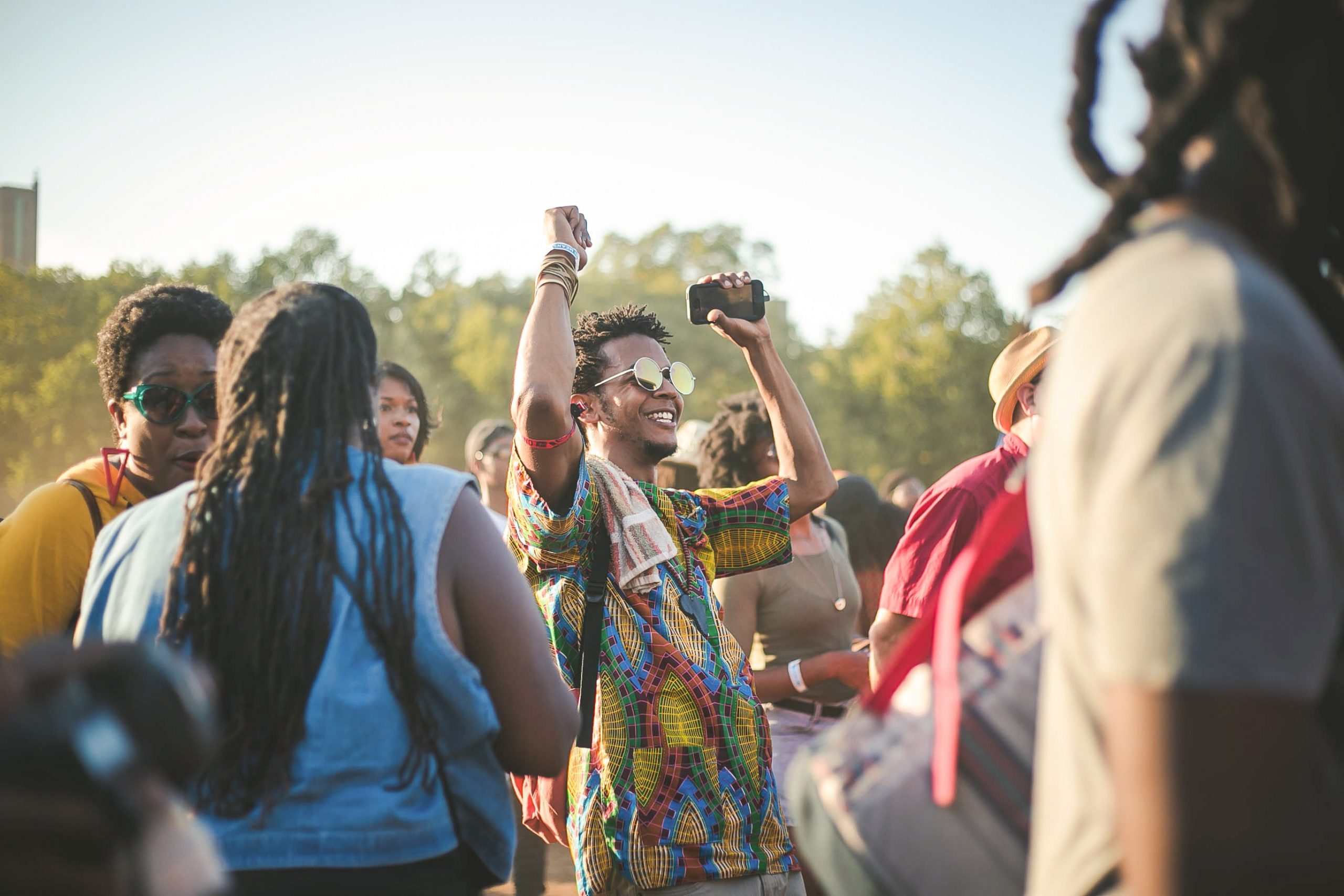
Eid Festival of Light
The Eid Festival of Light (also known as Eid al-Fitr) celebrates the completion of Ramadan, whereby Muslims break their fast. The festival, which takes place on different days each year, involves feasts, dancing, and prayers in commemoration of one of Islam’s five pillars. The month of Ramadan is designed to be a period of reflection, therefore, once it is concluded, Muslims celebrate Eid to honour their community and dedication to their faith.
In the UK, the holiday is celebrated most notably in Trafalgar Square, and it is hosted by the Mayor of London. It is also an event that is open to people of all faiths and is one of the most significant cultural highlights of London’s events calendar. The festival draws great crowds and allows the people of London to learn about Muslim culture and celebrate with their friends and family, while also witnessing fantastic firework displays.
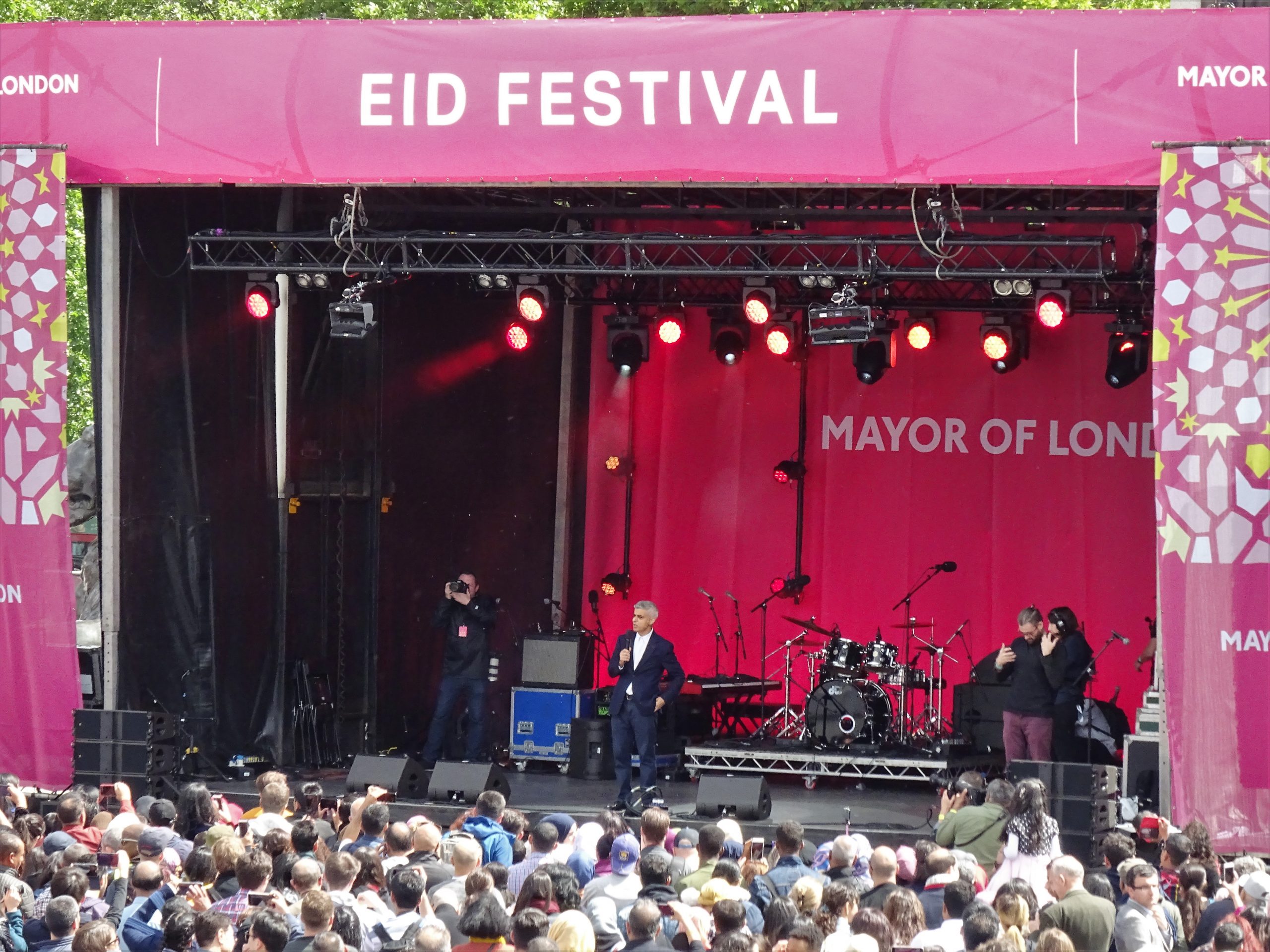
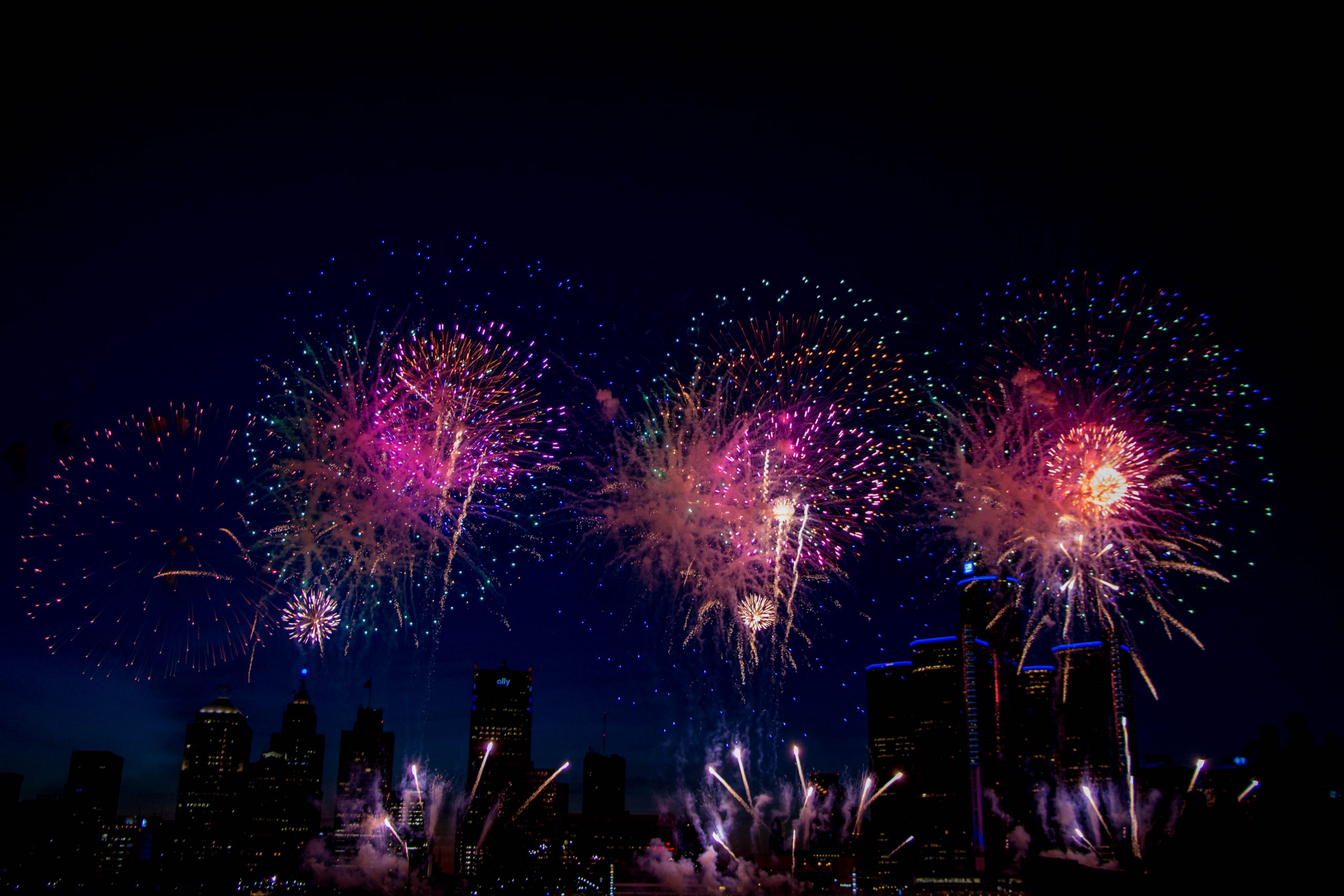
St Patrick’s Day
Britain marks St Patrick’s Day with fun and spectacular events every year, usually on the weekend closest to 17 March. It is a global celebration of the Irish culture and particularly remembers St Patrick, Ireland’s patron saint, who ministered in Christianity in Ireland during the fifth century.
With more than 70 floats, bands, and marching groups passing through the streets, Manchester is known to showcase the UK’s largest St. Patrick’s Day Parade. However, London, Birmingham and Edinburgh also hold a long-established reputation of celebrating St Patrick’s Day with style.
Many people tend to wear an item of green clothing on the day whilst celebrations are held featuring Irish food and drinks that are often dyed in green food colouring. During this time, people take part in parades and dancing, eat Irish food, and enjoy huge firework displays. It is no shock that most Irish pubs will be crowded with people celebrating the event, given how significant Irish culture is to British society.
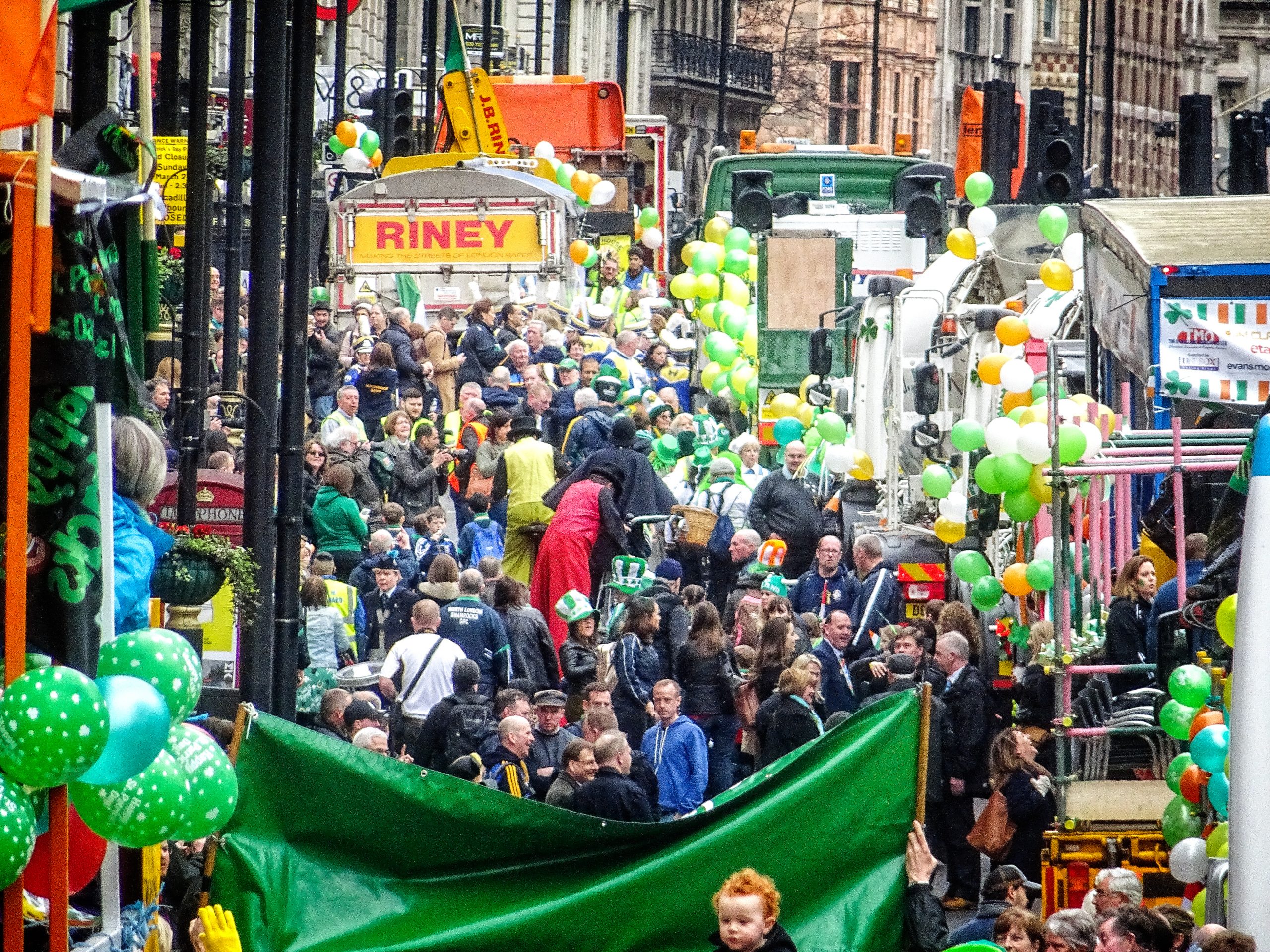 Photos taken at the 2017 St Patrick's Day Parade and Festival in London.
Photos taken at the 2017 St Patrick's Day Parade and Festival in London.
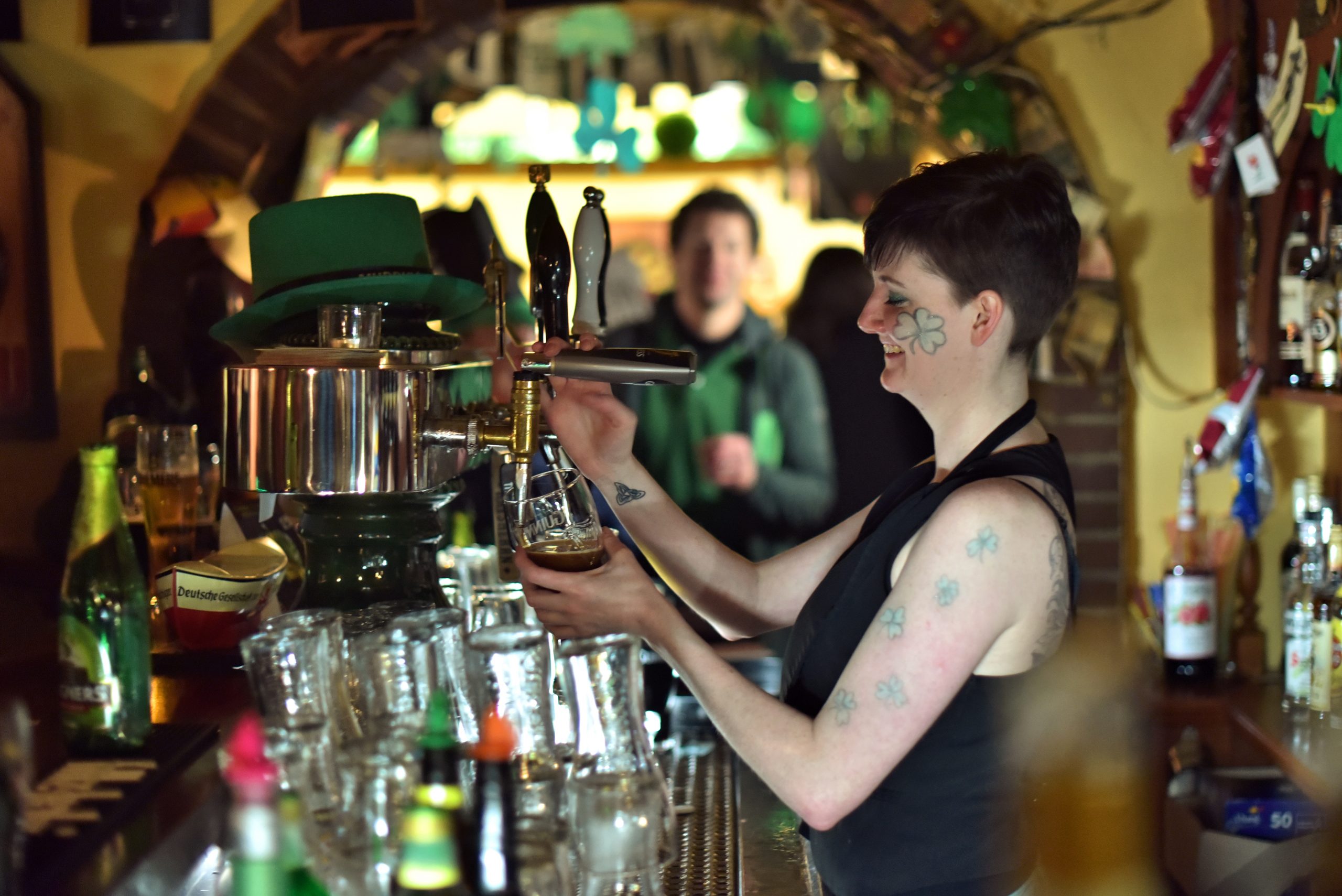
Carnaval Del Pueblo
Carnaval Del Pueblo is the biggest Latin American festival in Europe and it is held every year in London. The 10-hour festival is based on a fun-filled procession that leaves Elephant and Castle and moves to Burgess Park. Thousands of people visit the festival to enjoy themselves with music, rhythm, dance and food representing the Latin American culture.
Usually taking place in the first week of August, the festival has been established since 1999, representing 19 countries in total. Through this spectacular carnival, members of the wider community are able to celebrate and embrace these diverse backgrounds. The event aims to raise awareness and create an understanding of the diverse cultural legacy of Latin American nations.
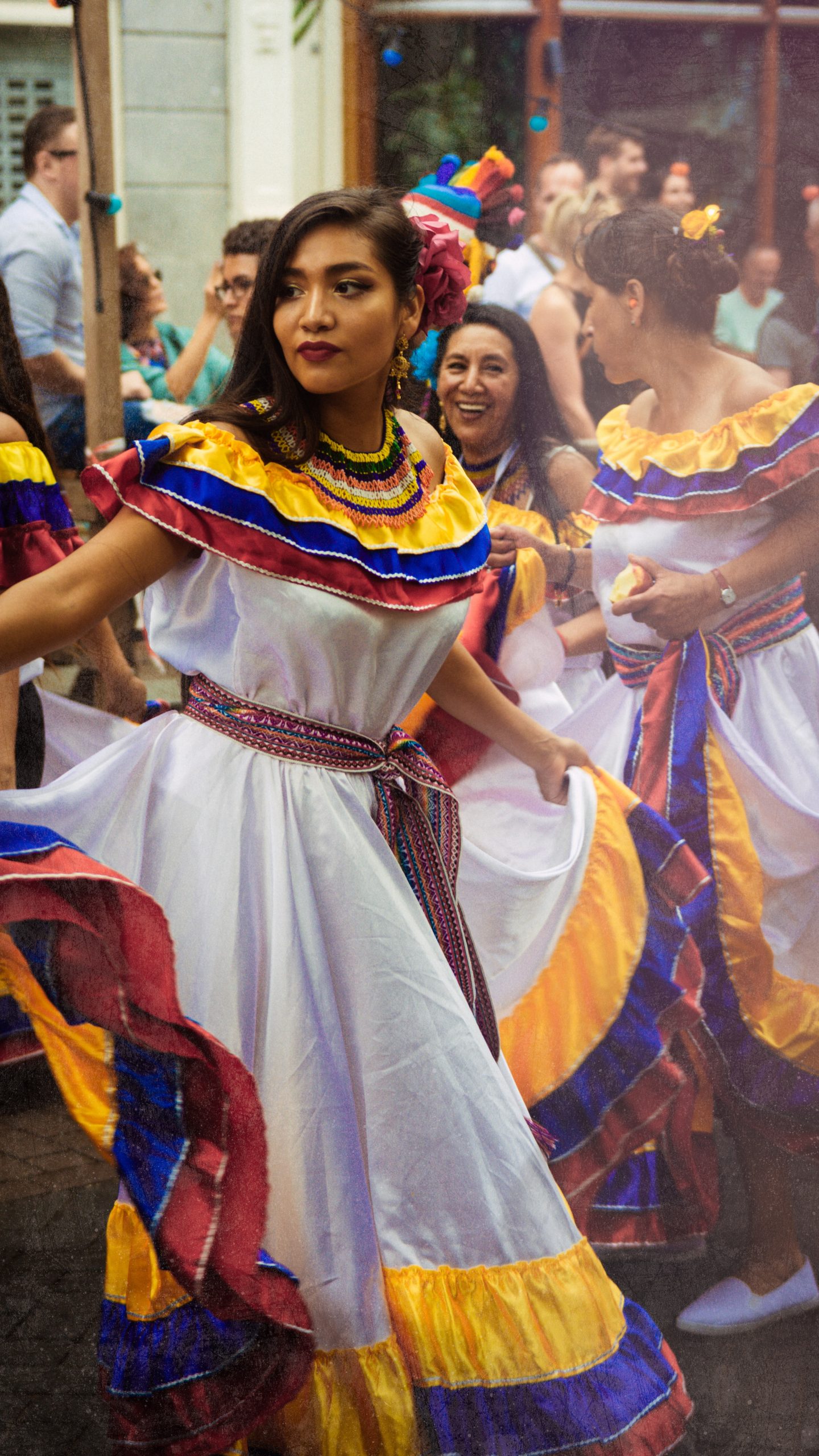
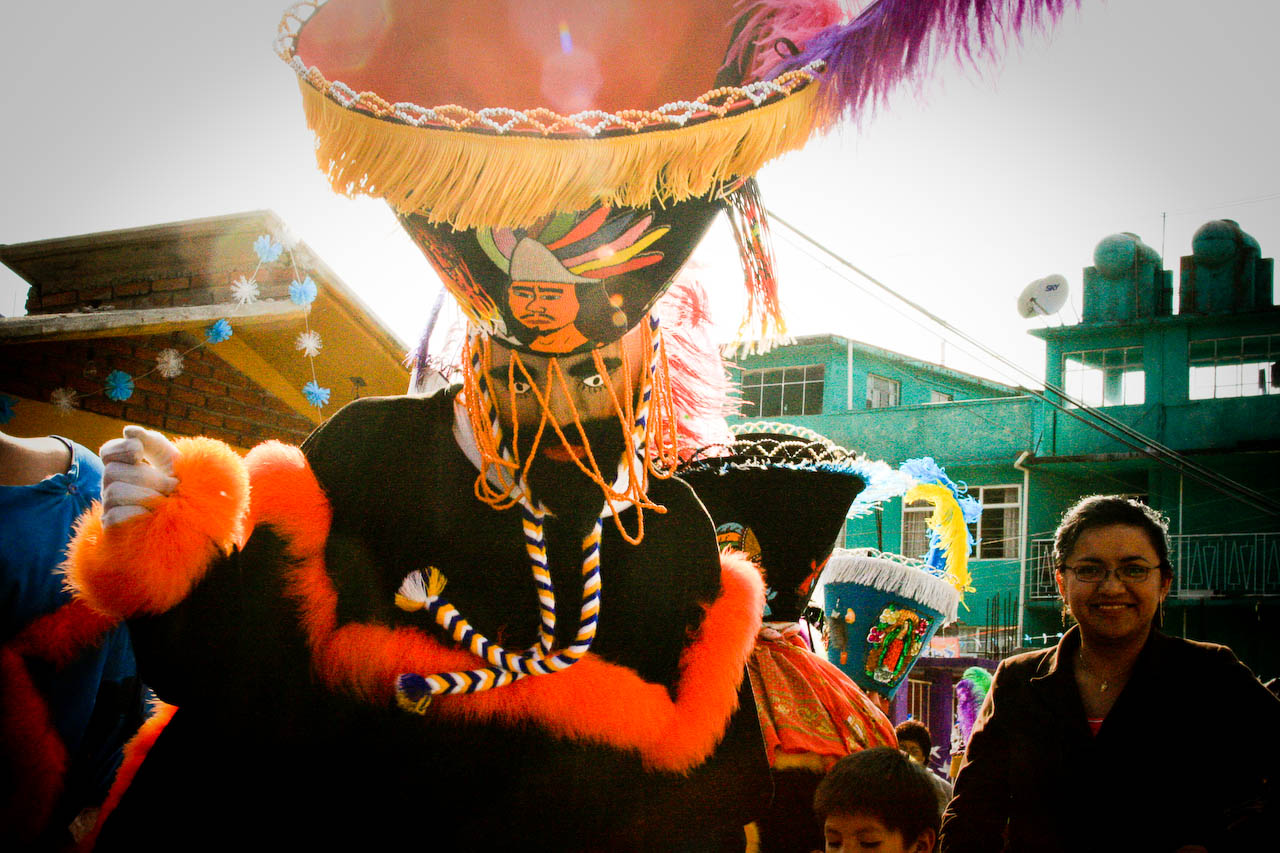
Holi Festival
The Holi festival is a two-day annual Hindu celebration that marks the arrival of Spring. It is also known as the ‘festival of love’ and the ‘festival of colours’, and it is typically celebrated in early March. Principally, the event commemorates the victory of good, peace and love over evil.
It is said the demoness, Holika, was conquered through unwavering devotion to the Hindu god of preservation, Lord Vishnu. Vishnu’s reincarnation Lord Krishna liked to play pranks on village girls by drenching them in water and colours – which is where the tradition came from.
Hindus celebrate Holi by smearing coloured powder over one another, dancing under water sprinklers, and using water balloons and water guns. The organisers believe that ‘Gulal’ (the coloured powder) intoxicates people, so their religion and social status do not matter. Gulal powder comes in a variety of colours, each of which is associated with a different meaning: red is associated with love, blue with Lord Krishna, yellow with the usage of turmeric (a spice used in many Indian dishes), and green with spring.
Holi celebrations are open to all and see all different kinds of people come together to play and celebrate as a community. In the past, Holi has famously been observed in cities like Birmingham, Leicester and London.
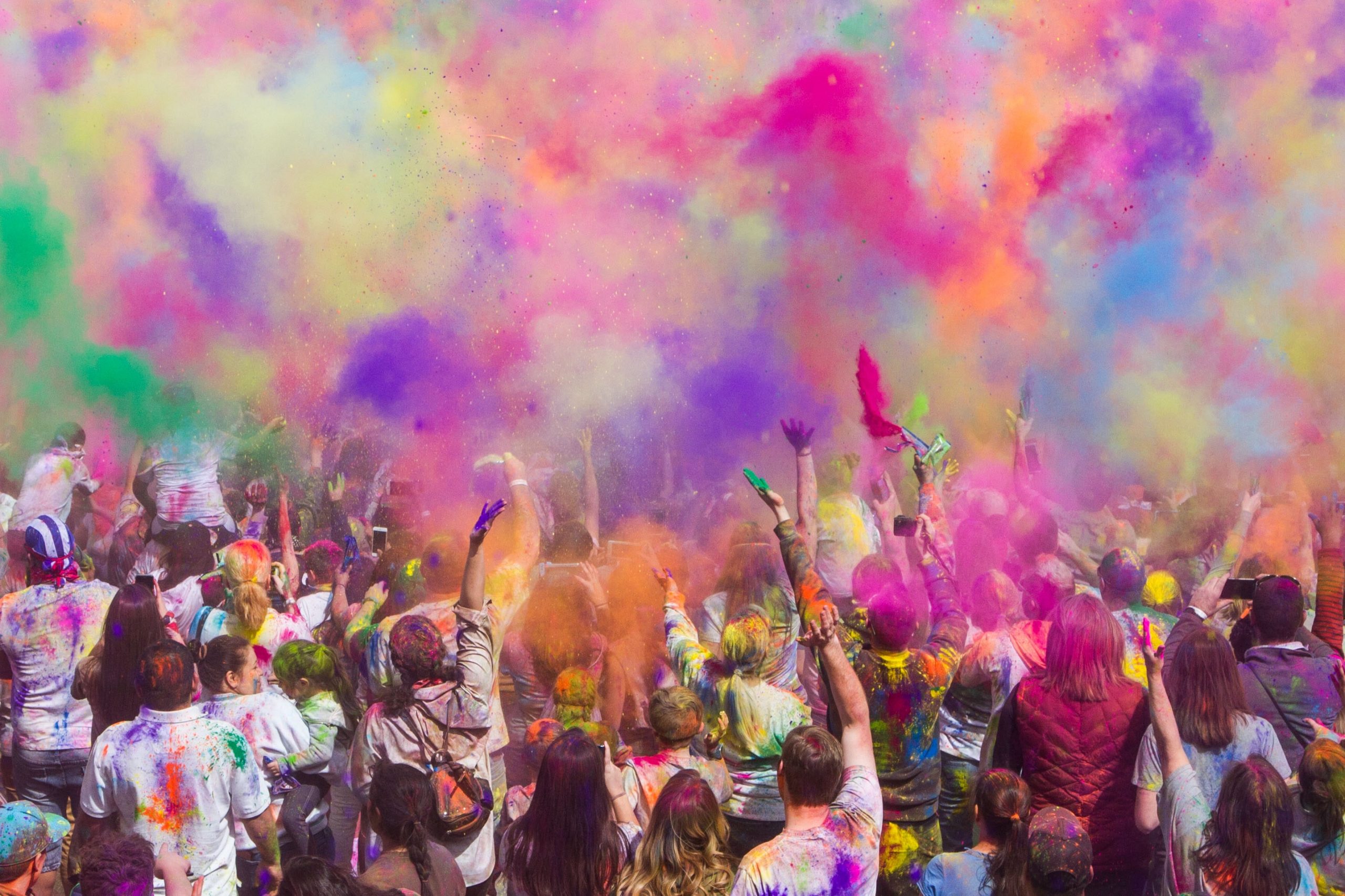
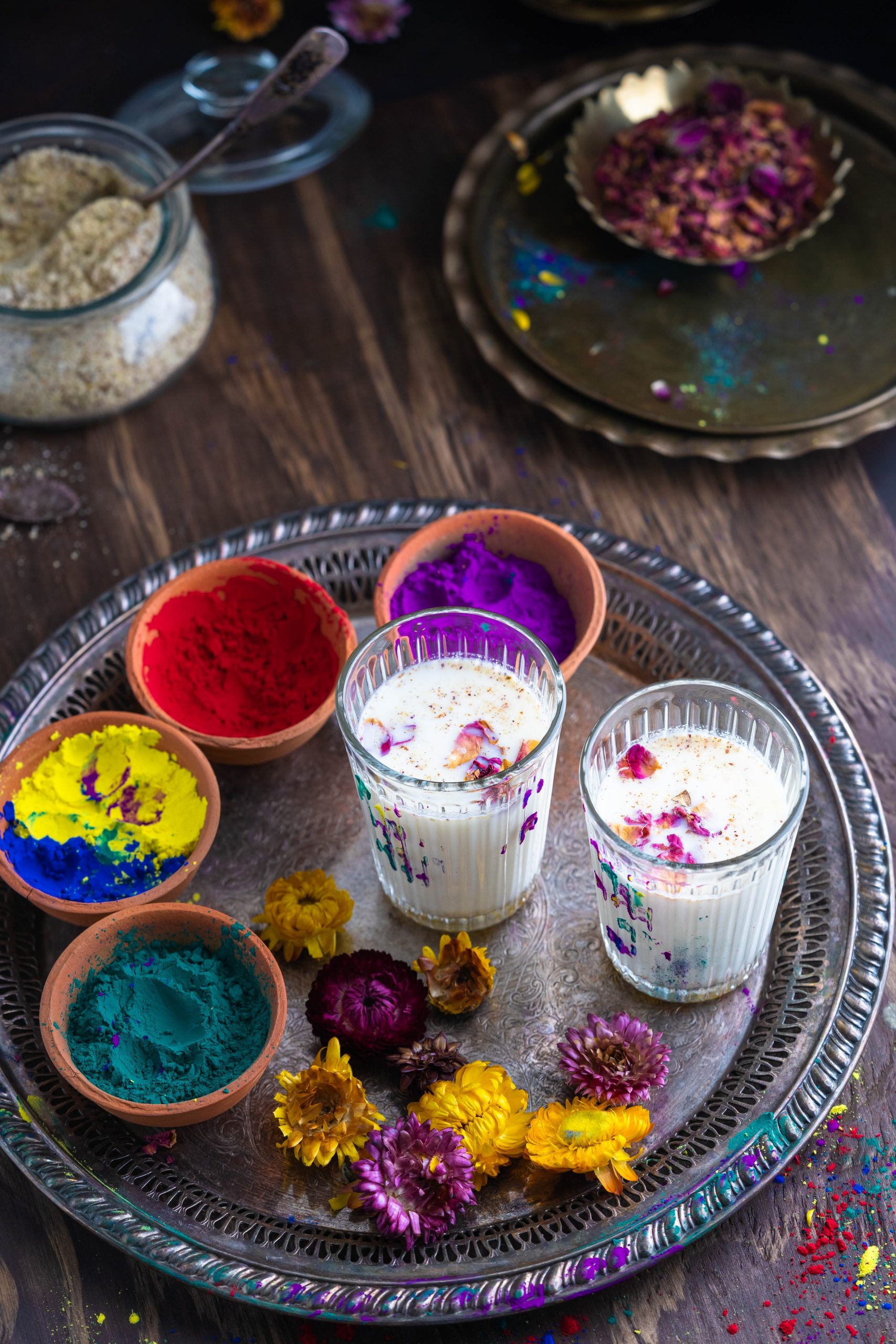
Oktoberfest
The event is a celebration of Bavarian history and was launched in 1810 (in Munich) in honour of the Crown Prince Ludwig’s marriage to Princess Therese von Sachsen-Hildburghausen. This evolved into a yearly celebration that takes place over October.
The original Spiegeltent tents were inspired by the spectacular marquees and tents featured at this 19th-century event, and are now popular at arts and cultural festivals throughout the Western world. Beer halls and gardens from Edinburgh to Exeter and Belfast to Birmingham welcome thirsty revellers for drinking to the sound of brass band music.
At the Queen Elizabeth Olympic Park in Stratford, London, organisers ship more than 250,000 pints of Erdinger and Fischers Hell lager to quench the thirst of up to 5,000 guests each night. Ultimately, these celebrations see classic German beers and music performances, alongside dancing and celebrations that celebrate German culture.
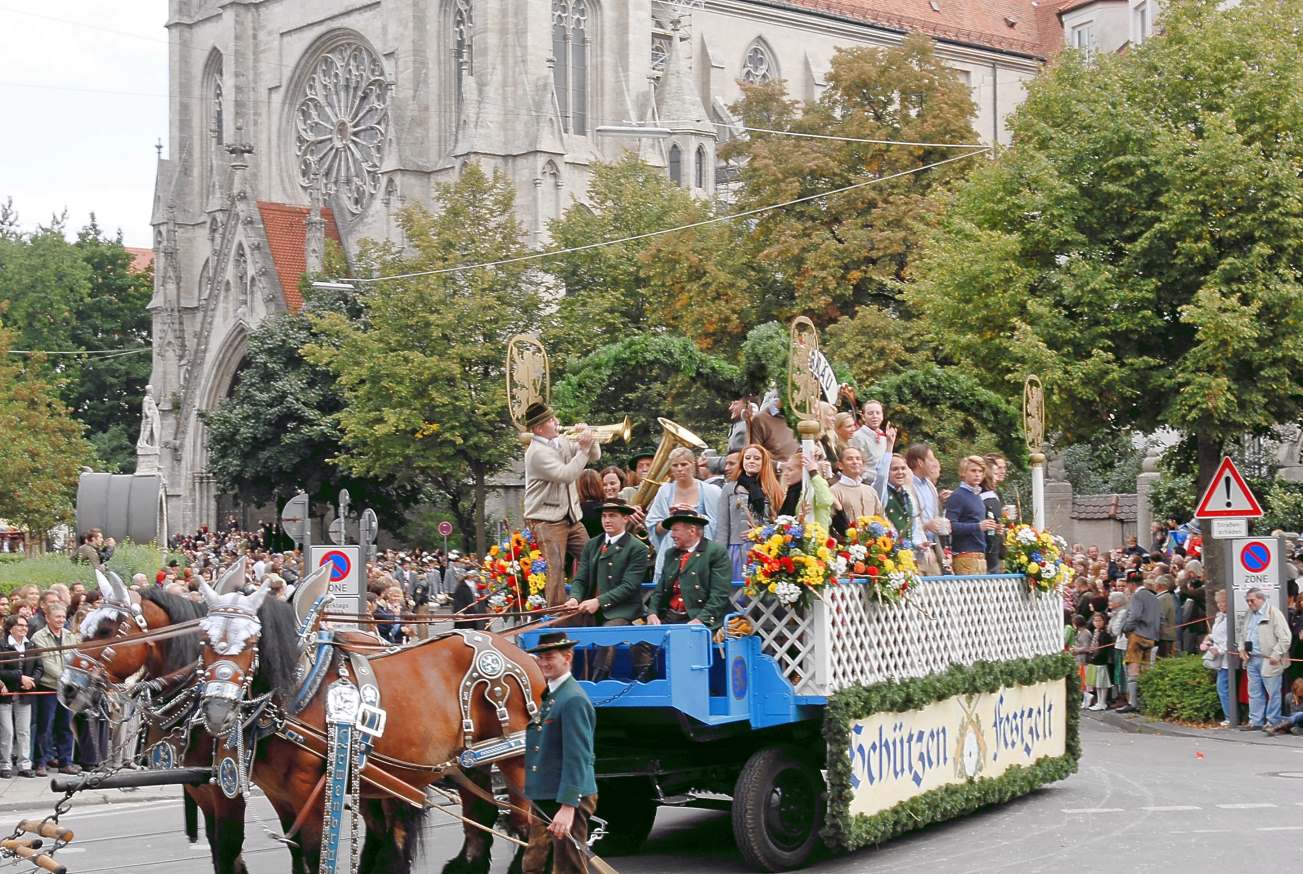
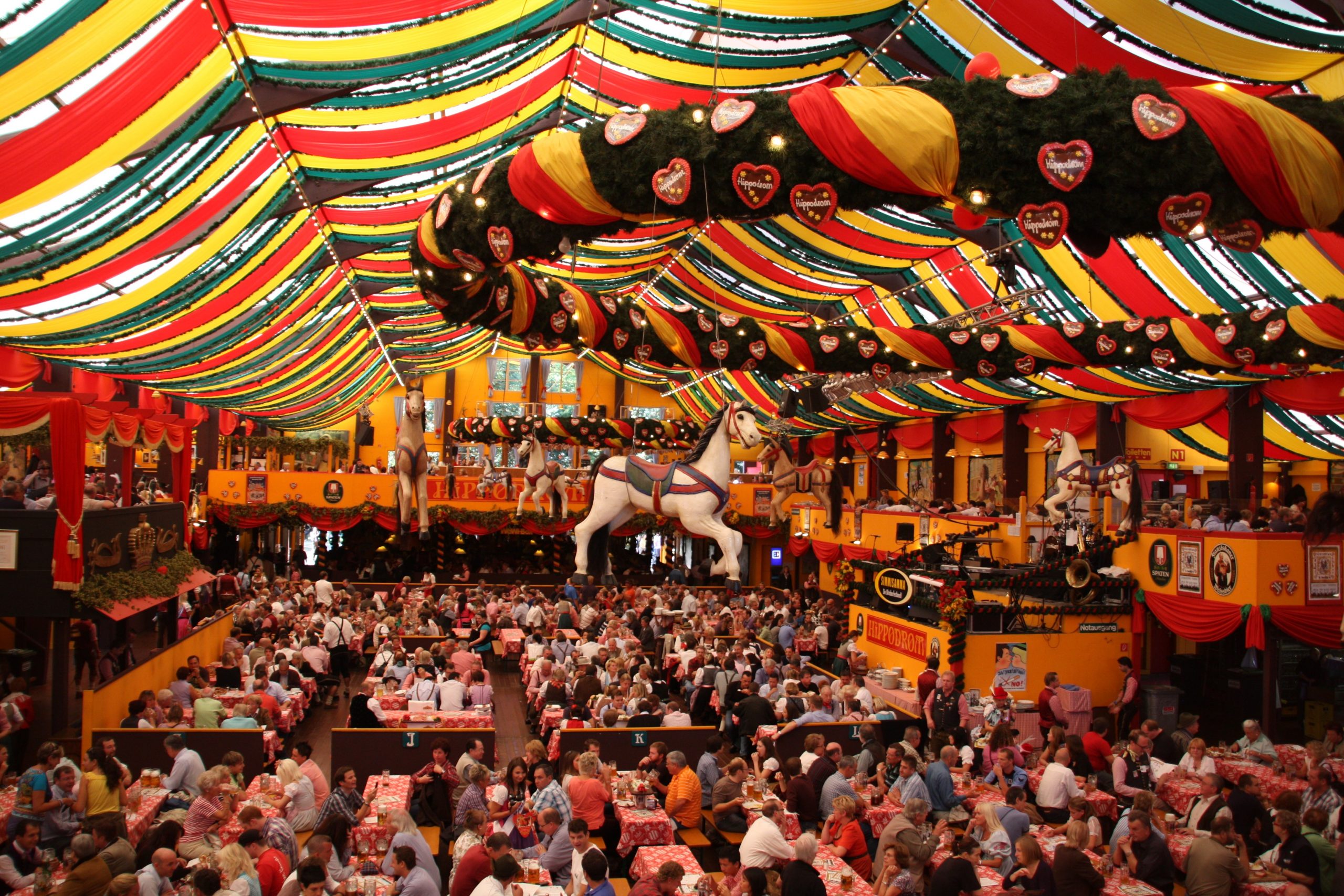
Billingham International Folklore Festival of World Dance (BIFF)
The annual Billingham International Folklore Festival (BIFF) began in the 1960s, when an Irish dance company performed at a traffic-free retail shopping centre in Billingham. Councillors then came up with the concept of hosting a folklore festival, which they did for the first time in 1965.
It currently invites artists from all around the world. It takes place in the county of Durham, around mid-August. Instead of focusing on a single culture, the BIFF strives to include cultures from all around the world. It is about bringing people together and celebrating traditional and contemporary dance.
The festival has achieved a lot over the years to increase awareness and appreciation of the world’s folk history, which has helped people comprehend our common worldwide heritage. Individuals can take part in professional multi-cultural craft workshops whilst observing famous dance styles (including Flamenco, Kathak and Maori) that are showcased along with traditional dance costumes and musical instrument presentations for children and adult audiences.
The festival has recently been awarded a grant from the National Lottery Community Fund totalling £10,000 for “standing out as an exemplary festival [in the way] it engages with other art forms and sport disciplines, unlike any other festival”.
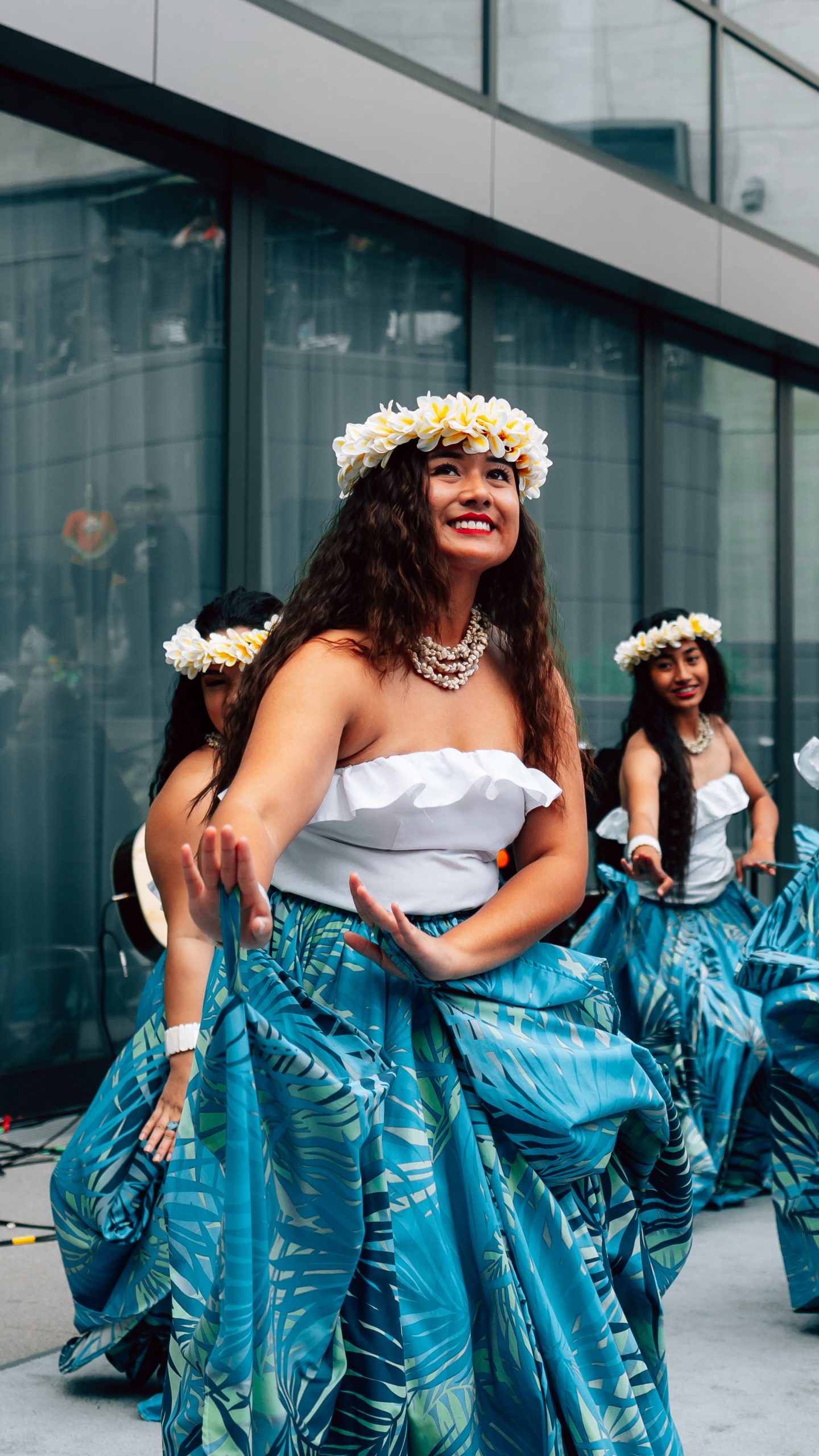
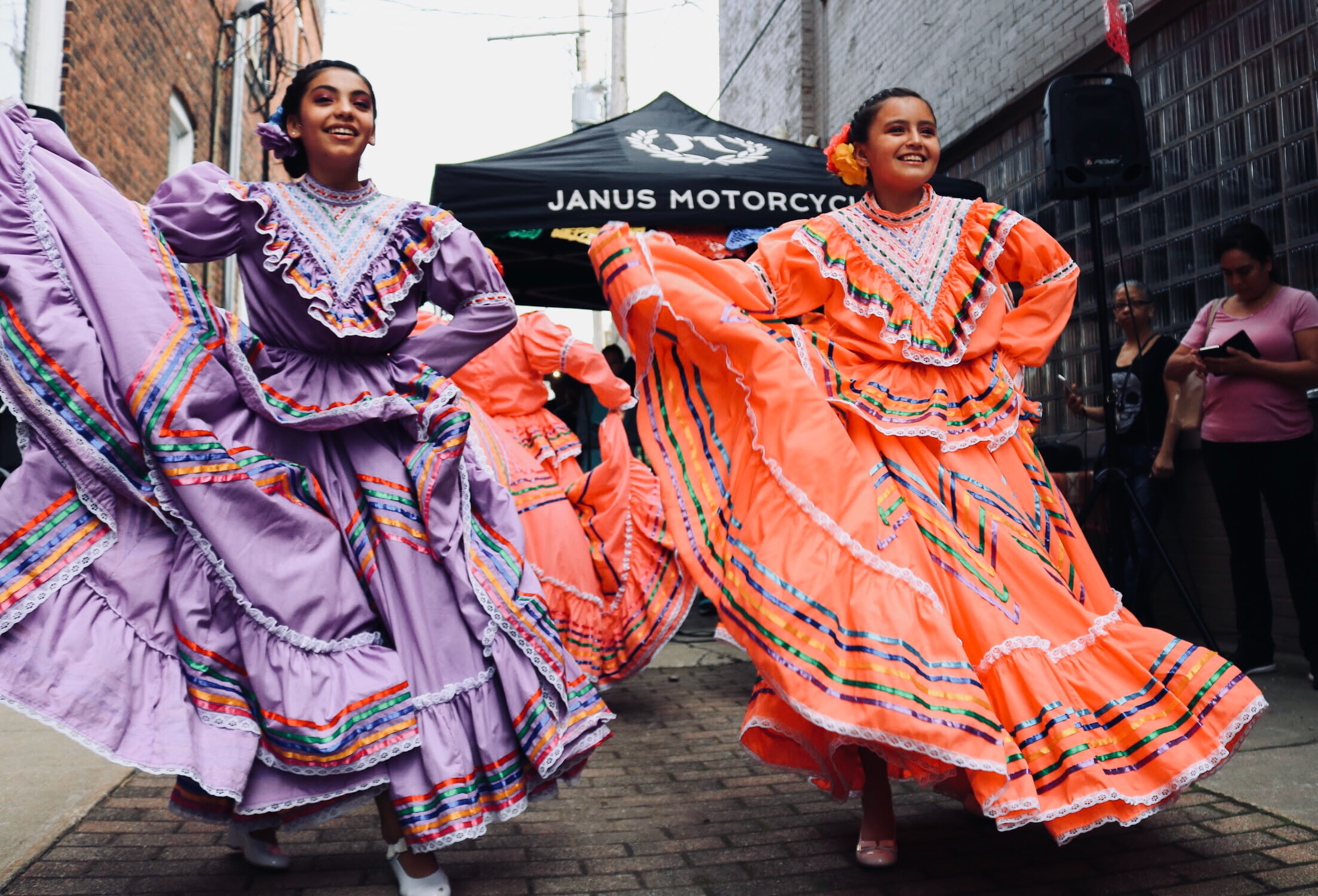


카지노 says:
What a information of un-ambiguity and preserveness of valuable experience regarding unpredicted feelings.
M88 says:
I think this is one of the most vital info for me. And i am glad
reading your article. But want to remark on some general things, The website
style is wonderful, the articles is really great : D. Good job, cheers
bet calcio domani says:
I’d like to find out more? I’d like to find out some additional information.
หารายได้เสริม says:
Hello, its pleasant post about media print, we all know media is a
wonderful source of data.
퍼스트카지노 says:
This paragraph is genuinely a fastidious one it helps new the web
visitors, who are wishing for blogging.
online blackjack says:
Excellent goods from you, man. I have understand
your stuff previous to and you’re just extremely magnificent.
I really like what you have acquired here, certainly like what you are stating and
the way in which you say it. You make it entertaining and you still take care of to keep it wise.
I can not wait to read far more from you. This is actually a great website.
becrick says:
My developer is trying to convince me to move to .net from PHP.
I have always disliked the idea because of the expenses.
But he’s tryiong none the less. I’ve been using Movable-type on a variety of websites for about a year and am anxious
about switching to another platform. I have heard excellent things about blogengine.net.
Is there a way I can transfer all my wordpress posts into it?
Any kind of help would be greatly appreciated!
카지노사이트 says:
This website certainly has all the information I wanted about this
subject and didn’t know who to ask.
วิธี หาเงิน โดย ไม่ ต้อง ลงทุน says:
I delight in, result in I found just what I was
taking a look for. You have ended my 4 day lengthy hunt!
God Bless you man. Have a great day. Bye
uE6dR6fO1S6 says:
Hmm is anyone else having problems with the pictures on this
blog loading? I’m trying to find out if its a problem on my end or if it’s the
blog. Any feedback would be greatly appreciated.
live casino says:
I am not sure the place you’re getting your information, but
good topic. I needs to spend some time learning more or working out more.
Thanks for excellent info I used to be on the lookout
for this info for my mission.
온라인카지노 says:
Hello there! I know this is kinda off topic but I’d figured I’d ask.
Would you be interested in trading links or maybe guest writing a blog post or vice-versa?
My site goes over a lot of the same topics as yours and I think we could greatly benefit
from each other. If you might be interested feel free to shoot me an email.
I look forward to hearing from you! Excellent blog by the way!
1xbet 출금 says:
Very nice post. I just stumbled upon your weblog and wished to say that I have really loved browsing your weblog posts.
After all I’ll be subscribing for your rss feed and I’m
hoping you write once more very soon!
YAr3akg1C/IvN9kW3Y2 says:
Greetings! Very helpful advice within this article! It is the little changes
that produce the most significant changes. Thanks for sharing!
nZ9G0qL8rT9 says:
Thank you for another great post. The place else could
anybody get that type of information in such a
perfect way of writing? I’ve a presentation subsequent week, and I’m on the search for such information.
코인카지노 says:
What a material of un-ambiguity and preserveness of precious familiarity about unexpected emotions.
007카지노 says:
I always used to read paragraph in news papers but now as I
am a user of net so from now I am using net for articles
or reviews, thanks to web.
หาเงิน หน่อย says:
Oh my goodness! Amazing article dude! Many thanks, However I
am experiencing troubles with your RSS. I don’t know the reason why I can’t join it.
Is there anybody having similar RSS issues? Anybody who knows
the solution will you kindly respond? Thanx!!
메리트카지노 says:
Good post. I learn something new and challenging on blogs I
stumbleupon on a daily basis. It’s always useful to read
through content from other writers and practice a little something from other websites.
12bet mobile says:
I’m no longer certain where you’re getting your info, but good topic.
I needs to spend a while finding out much more or understanding more.
Thanks for fantastic info I was searching for this information for my mission.
솔레어카지노 says:
WOW just what I was searching for. Came here by searching for 카지노
scommesse live says:
After I originally left a comment I appear to have clicked the -Notify me when new comments are added- checkbox
and now every time a comment is added I recieve four emails with
the same comment. There has to be an easy method you can remove me from that
service? Thanks!
YIh8gcz7Q/MyY7eJ3J4 says:
Hmm it seems like your site ate my first comment (it was super long) so I guess I’ll just sum it up what I wrote and say, I’m thoroughly enjoying your blog.
I as well am an aspiring blog writer but I’m still new to the whole thing.
Do you have any helpful hints for rookie blog writers?
I’d certainly appreciate it.
zL5hG6nA2C3 says:
Magnificent items from you, man. I’ve remember your stuff previous to and you are simply extremely magnificent.
I really like what you’ve got here, really like what you’re
stating and the best way wherein you say it. You make it
enjoyable and you continue to care for to stay it smart.
I can’t wait to read far more from you. This is
really a terrific web site.
더킹카지노 says:
Thankfulness to my father who shared with me concerning this web site, this blog is genuinely awesome.
퍼스트카지노 says:
I do accept as true with all the concepts you’ve presented for
your post. They’re really convincing and can definitely work.
Nonetheless, the posts are very brief for newbies.
Could you please extend them a bit from next time? Thanks for the post.
DRw0jmc3P/XtS1tC4W3 says:
Nice post. I learn something totally new and challenging on blogs I stumbleupon every day.
It’s always useful to read content from other writers and use a little
something from other sites.
코인카지노 says:
Somebody necessarily lend a hand to make severely
articles I might state. That is the first time I frequented your website page and to this point?
I amazed with the analysis you made to make this actual submit extraordinary.
Wonderful activity!
virtual job fair says:
Hi, i read your blog occasionally and i own a similar one and i was just curious if you get a
lot of spam remarks? If so how do you reduce it, any plugin or anything you can recommend?
I get so much lately it’s driving me crazy so any assistance is
very much appreciated.
KAn3jpp6M/GfT5mY1V0 says:
I am regular reader, how are you everybody?
This post posted at this web page is genuinely fastidious.
lD4cU9fI3O9 says:
Have you ever considered about adding a little bit more than just your articles?
I mean, what you say is valuable and everything. Nevertheless think about if you added some
great images or video clips to give your posts more, “pop”!
Your content is excellent but with images and clips, this blog could undeniably be
one of the best in its niche. Superb blog!
oR1sT0uA8S6 says:
I loved as much as you will receive carried out right here.
The sketch is attractive, your authored subject matter stylish.
nonetheless, you command get bought an nervousness over that you wish be delivering the following.
unwell unquestionably come more formerly again as exactly
the same nearly very often inside case you shield this increase.
e books login says:
Good day! This is my 1st comment here so I
just wanted to give a quick shout out and tell you I genuinely
enjoy reading your blog posts. Can you recommend any other blogs/websites/forums that deal with the same subjects?
Thanks for your time!
다파벳 가입 says:
Thanks in favor of sharing such a pleasant thought, post is good, thats
why i have read it completely
perforated paper towels says:
Way cool! Some extremely valid points! I appreciate you penning this
article and the rest of the site is also really good.
オンラインカジノ says:
My partner and I stumbled over here from a different
web page and thought I might check things out. I like what I see so now i’m following
you. Look forward to checking out your web page yet again.
wisdom tooth extraction says:
Greate article. Keep writing such kind of info on your page.
Im really impressed by it.
Hey there, You’ve done an incredible job. I’ll definitely digg
it and individually suggest to my friends. I’m sure they’ll be benefited from this site.
カジノ says:
Hey very nice site!! Guy .. Beautiful .. Wonderful ..
I’ll bookmark your blog and take the feeds additionally?
I am happy to find numerous useful info right here within the
publish, we need develop extra techniques in this regard, thank you for sharing.
. . . . .
soi cau online says:
My brother suggested I might like this blog. He was entirely right.
This post actually made my day. You cann’t imagine just how much time I had spent for this information! Thanks!
scommesse sportive says:
My spouse and I stumbled over here coming from a different
page and thought I might check things out. I like what I see so now i’m
following you. Look forward to looking at your web page for
a second time.
online gambling says:
Having read this I thought it was extremely informative.
I appreciate you taking the time and effort to put this informative article
together. I once again find myself spending way too much time both reading and commenting.
But so what, it was still worth it!
메리트카지노 says:
What’s up to every one, it’s truly a good for me to pay a visit this web page, it consists of useful Information.
카지노사이트 says:
I enjoy what you guys are usually up too.
This kind of clever work and reporting! Keep up the excellent works guys I’ve added you
guys to my personal blogroll.
ルーレット 勝ち方 says:
What’s up everyone, it’s my first visit at this web
site, and piece of writing is really fruitful in support of me,
keep up posting these types of articles or reviews.
tài xỉu bịp says:
I’m curious to find out what blog platform you happen to be utilizing?
I’m having some small security issues with my latest site and I’d like
to find something more secure. Do you have any solutions?
oS9oL7dH1L6 says:
You actually make it seem so easy with your presentation but I find this topic to
be really something which I think I would never understand.
It seems too complicated and very broad for me. I’m looking forward for your next post, I’ll try to get
the hang of it!
솔레 어 에이전시 says:
you are truly a just right webmaster. The web site loading velocity is incredible.
It seems that you’re doing any unique trick. Furthermore, The contents are masterwork.
you’ve done a wonderful process in this matter!
HPu1xkh3Y/XkD4tX5K1 says:
This design is spectacular! You most certainly know how to keep a reader entertained.
Between your wit and your videos, I was almost moved to start
my own blog (well, almost…HaHa!) Excellent job. I really enjoyed what you had to say, and more
than that, how you presented it. Too cool!
インター カジノ おすすめ スロット says:
These are really enormous ideas in concerning blogging. You have touched some fastidious factors
here. Any way keep up wrinting.
オンライン カジノ says:
Hey I am so excited I found your webpage, I really found you by error, while I was
researching on Aol for something else, Regardless
I am here now and would just like to say thanks a lot for a remarkable post and a all round thrilling blog (I
also love the theme/design), I don’t have time
to read it all at the moment but I have saved it
and also included your RSS feeds, so when I have time I will
be back to read more, Please do keep up the great work.
Slot says:
A person essentially lend a hand to make critically posts I might
state. That is the first time I frequented your web page and to this point?
I surprised with the analysis you made to create this actual publish extraordinary.
Wonderful job!
카지노 says:
I am extremely inspired along with your writing abilities and also with
the structure for your blog. Is this a paid topic or did you modify
it yourself? Anyway stay up the nice quality writing, it is
rare to peer a nice blog like this one today..
ma sói says:
Excellent blog here! Also your site loads up very fast!
What host are you using? Can I get your affiliate link to your host?
I wish my site loaded up as quickly as yours lol
scommesse italia says:
Hi are using WordPress for your blog platform? I’m new to the blog world but I’m trying to get started and create my
own. Do you need any html coding knowledge to make your own blog?
Any help would be greatly appreciated!
nj travel advisory says:
With havin so much content and articles do you ever run into
any problems of plagorism or copyright violation? My
blog has a lot of exclusive content I’ve either authored myself or outsourced but it appears a
lot of it is popping it up all over the web
without my authorization. Do you know any methods to help stop content from being ripped off?
I’d genuinely appreciate it.
how to play poker says:
Appreciate the recommendation. Let me try it out.
yE7Q3cX1pZ7 says:
Pretty section of content. I just stumbled upon your weblog and in accession capital to
assert that I get actually enjoyed account your
blog posts. Anyway I’ll be subscribing to your feeds
and even I achievement you access consistently rapidly.
더나인카지노 says:
Howdy! This is my first visit to your blog! We are a group of
volunteers and starting a new initiative in a community in the same
niche. Your blog provided us beneficial information to work on. You have done a marvellous job!
giocodigitale bingo says:
Link exchange is nothing else except it is only placing the other person’s webpage
link on your page at proper place and other person will also do similar in support of you.
chơi đánh bài says:
There’s definately a lot to learn about this subject.
I like all of the points you have made.
카지노 says:
Hey would you mind letting me know which hosting company you’re
utilizing? I’ve loaded your blog in 3 completely different internet browsers and I must say this blog loads a
lot faster then most. Can you recommend a good web hosting
provider at a reasonable price? Cheers, I appreciate it!
indian casino says:
Its like you read my mind! You appear to grasp a lot about this, like you wrote the e-book in it or something.
I feel that you could do with some % to pressure the message house a little bit, however other than that, that is magnificent blog.
A fantastic read. I’ll certainly be back.
casino trực tuyến says:
Hi to every one, the contents existing at this website are actually amazing for people knowledge, well,
keep up the good work fellows.
カジノシークレット 入金 says:
For most up-to-date news you have to pay a quick visit internet and
on the web I found this site as a most excellent web site for latest updates.
link nha cai says:
There is definately a great deal to know about this topic.
I love all the points you have made.
Casino Trực Tuyến says:
Your style is unique in comparison to other
people I have read stuff from. Many thanks for posting when you’ve got the opportunity, Guess I will just book mark this web site.
レオネット says:
It’s not my first time to visit this web site, i am visiting this web site dailly and obtain pleasant information from here all the time.
tV8W3rY2fO4 says:
Great beat ! I would like to apprentice while you
amend your web site, how can i subscribe for a blog web site?
The account aided me a acceptable deal. I had been tiny bit acquainted of
this your broadcast provided bright clear concept
xổ số hà nội says:
Very good article. I am going through some of these issues
as well..
หาเงิน รู เบิ ล says:
Good write-up. I certainly love this website.
Keep it up!
block trade says:
Your style is so unique in comparison to other people I’ve read stuff from.
Thanks for posting when you have the opportunity, Guess I’ll just bookmark this site.
LJl0phw9R/HyQ2dS4U3 says:
I was suggested this blog by my cousin. I am not sure whether
this post is written by him as no one else know such detailed about
my trouble. You’re incredible! Thanks!
หาเงิน เข้า wallet 2021 ฟรี says:
Spot on with this write-up, I honestly feel this amazing site needs far more attention. I’ll probably be returning to read more,
thanks for the information!
fL7L5aP7aD6 says:
Hello it’s me, I am also visiting this web page
on a regular basis, this site is in fact good and the viewers are actually sharing
pleasant thoughts.
betting apps in india says:
When someone writes an article he/she maintains the idea of
a user in his/her mind that how a user can know it.
Thus that’s why this post is great. Thanks!
bet365 出 金 says:
I blog quite often and I genuinely appreciate your content.
This article has really peaked my interest. I
am going to book mark your site and keep checking for new information about once per week.
I opted in for your Feed too.
xV6kV2mK7U1 says:
When someone writes an paragraph he/she maintains the image of a user
in his/her mind that how a user can be aware of it. Thus that’s why this paragraph is amazing.
Thanks!
솔레어카지노 says:
I am regular reader, how are you everybody? This article posted at this web page is genuinely fastidious.
オンラインカジノ says:
I think this is one of the most vital information for me. And i’m glad reading your article.
But want to remark on some general things, The web site style
is wonderful, the articles is really great : D. Good job, cheers
LGh4oeg7R/RmJ3sA5Z7 says:
Hey there! Someone in my Myspace group shared this website with us so I came
to look it over. I’m definitely loving the information. I’m book-marking and will be
tweeting this to my followers! Exceptional blog and outstanding style and design.
aws architecture diagram says:
excellent issues altogether, you simply gained a new reader.
What may you suggest in regards to your put up that
you simply made a few days in the past? Any sure?
mK1C2kX0rO5 says:
I am genuinely thankful to the owner of this site who has shared this fantastic post at
at this time.
casino trực tuyến says:
Thank you for the good writeup. It in fact was a amusement account it.
Look advanced to far added agreeable from you!
By the way, how can we communicate?
bet online says:
Thank you for another informative blog. Where else may
just I get that kind of information written in such
an ideal method? I’ve a mission that I am just now running on, and
I’ve been at the look out for such info.
007카지노 says:
I visited several web pages however the audio feature for audio songs existing
at this website is in fact marvelous.
메리트카지노 says:
I’m extremely inspired together with your writing abilities and also with the structure for your blog.
Is this a paid subject matter or did you customize it your self?
Either way keep up the excellent quality writing, it’s rare to peer
a great weblog like this one nowadays..
온라인 바카라 says:
We are a group of volunteers and starting a new scheme in our community.
Your web site provided us with valuable information to work on. You’ve done an impressive job
and our whole group will be thankful to you.
วิธี หาเงิน จาก เน็ต says:
We stumbled over here different website and thought I
might as well check things out. I like what I see so i am just following you.
Look forward to looking at your web page repeatedly.
더나인카지노 says:
Good day! I know this is kinda off topic but I was wondering if you knew where I could find a captcha plugin for
my comment form? I’m using the same blog platform as yours
and I’m having problems finding one? Thanks a lot!
betway live chat says:
Please let me know if you’re looking for a article writer for your blog.
You have some really good articles and I believe I would be a good asset.
If you ever want to take some of the load off, I’d really like to write some content for your blog in exchange for a link back to mine.
Please shoot me an e-mail if interested. Cheers!
코인카지노 says:
Excellent beat ! I wish to apprentice even as you amend your website, how can i subscribe for a weblog site?
The account aided me a acceptable deal. I were tiny bit acquainted of this
your broadcast provided bright transparent concept
casino says:
I’ll immediately seize your rss as I can not in finding your
e-mail subscription link or newsletter service.
Do you’ve any? Kindly permit me recognize so that I may just
subscribe. Thanks.
オンラインカジノ ボーナス says:
It’s great that you are getting thoughts from this article as well as
from our argument made here.
หวยลาว says:
Have you ever considered about adding a little bit more than just your articles?
I mean, what you say is fundamental and all. Nevertheless think about
if you added some great graphics or video clips to give your posts more, “pop”!
Your content is excellent but with images and video clips, this website could definitely
be one of the best in its field. Very good blog!
governor of poker says:
Do you have a spam problem on this website; I also am
a blogger, and I was wanting to know your situation; we have developed some nice practices and we
are looking to exchange techniques with other folks, please shoot me an e-mail if interested.
바카라 says:
It’s an awesome post designed for all the internet users; they will take advantage from it
I am sure.
インターカジノ says:
Excellent, what a webpage it is! This blog presents
useful facts to us, keep it up.
ブラックジャック ルール says:
I really like reading a post that can make men and women think.
Also, thanks for allowing me to comment!
ベラ ジョン カジノ 出 金 できない says:
Valuable information. Lucky me I discovered your website accidentally, and I am shocked why this coincidence didn’t took place earlier!
I bookmarked it.
bắn cá tài lộc says:
Excellent post. I was checking continuously this
blog and I’m impressed! Very useful info particularly the last part 🙂 I care for such info much.
I was looking for this particular information for a long time.
Thank you and best of luck.
jeetwin login says:
I am truly thankful to the owner of this web site who
has shared this enormous paragraph at at this time.
ox bet says:
Hey! I know this is somewhat off topic but I was wondering which blog
platform are you using for this site? I’m getting fed up of WordPress because I’ve
had problems with hackers and I’m looking at alternatives for another platform.
I would be great if you could point me in the direction of a good platform.
바카라 사이트 says:
I am sure this post has touched all the internet visitors, its really really fastidious piece of writing on building up new weblog.
cC2X2kI2dN4 says:
Thanks in support of sharing such a fastidious idea, article is fastidious, thats
why i have read it entirely
luật poker says:
I am extremely impressed with your writing
skills and also with the layout on your weblog.
Is this a paid theme or did you customize it yourself?
Either way keep up the excellent quality writing, it’s rare to see a great blog like this one today.
nG7aC6cY4G1 says:
I quite like looking through an article that can make men and women think.
Also, many thanks for permitting me to comment!
คาสิโน says:
Hello, yes this article is actually pleasant and I have learned lot of
things from it regarding blogging. thanks.
sbobet mobile says:
Nice post. I was checking constantly this weblog and
I am impressed! Very useful info particularly the ultimate part 🙂 I maintain such info a lot.
I used to be seeking this particular information for a very lengthy
time. Thanks and good luck.
wP4gV4fI6M4 says:
Have you ever thought about writing an e-book or guest authoring on other sites?
I have a blog based on the same information you discuss and would really like to have you share some stories/information. I know my subscribers would
enjoy your work. If you’re even remotely interested,
feel free to shoot me an email.
cong game says:
I have been exploring for a little bit for any high quality articles or weblog posts on this kind of house .
Exploring in Yahoo I eventually stumbled upon this site. Reading this
information So i’m glad to exhibit that I’ve a very excellent uncanny feeling I discovered just what
I needed. I most definitely will make sure to don?t forget
this web site and provides it a look regularly.
DHl8kzi0E/XzL2cK1U1 says:
After I originally left a comment I seem to have clicked the -Notify me
when new comments are added- checkbox and now each time a comment is added I receive 4 emails with the same comment.
Is there a way you are able to remove me from that service?
Thanks a lot!
cược bóng đá says:
I think the admin of this web site is actually working hard in favor of his web page,
because here every information is quality based information.
snai slot says:
I am now not positive where you are getting your information, but great topic.
I needs to spend some time finding out more or figuring out more.
Thanks for great information I used to be searching for this info
for my mission.
sK9dE5aU8N4 says:
Why users still make use of to read news papers when in this technological world the whole thing
is available on web?
ZGw5ozo9T/WvD7hK8J2 says:
I am sure this post has touched all the internet users, its really really pleasant post
on building up new webpage.
블랙잭 says:
I was extremely pleased to uncover this page. I wanted to thank
you for ones time for this particularly fantastic read!!
I definitely appreciated every little bit of it and i also have
you bookmarked to check out new stuff on your blog.
how to play poker says:
It is really a great and helpful piece of info.
I am happy that you just shared this helpful information with us.
Please keep us up to date like this. Thank you for sharing.
テキサスホールデム says:
Excellent pieces. Keep writing such kind of info on your site.
Im really impressed by your blog.
Hey there, You have done a great job. I will certainly digg it
and personally recommend to my friends. I am
confident they’ll be benefited from this website.
副業 在宅 says:
Hi everyone, it’s my first visit at this web page, and article is actually fruitful in favor of me, keep
up posting these types of articles.
andar bahar says:
Hi to every one, the contents present at this web page are truly awesome for people knowledge, well,
keep up the nice work fellows.
chơi cờ tướng miễn phí says:
Good day! I just would like to offer you a big thumbs up for
the great info you’ve got here on this post. I am coming back
to your web site for more soon.
온라인 바카라 says:
hello!,I really like your writing very a lot! share we keep
in touch extra about your post on AOL? I need a specialist
on this house to solve my problem. Maybe that’s you! Looking forward to peer you.
바카라 says:
I’m more than happy to uncover this site. I wanted to thank you for ones time for this fantastic read!!
I definitely enjoyed every little bit of it and i also have you saved as a favorite to
see new stuff in your web site.
카지노사이트 제작 says:
Today, I went to the beach front with my children. I found a sea shell and gave it to my 4 year old daughter and
said “You can hear the ocean if you put this to your ear.” She put the shell to her ear and screamed.
There was a hermit crab inside and it pinched her ear.
She never wants to go back! LoL I know this is entirely off topic but
I had to tell someone!
チェリー カジノ v プリカ says:
Why people still make use of to read news papers when in this technological world the whole
thing is existing on web?
Bingo says:
I have read so many articles about the blogger lovers except this paragraph is
genuinely a good post, keep it up.
hướng dẫn chơi bài mậu binh says:
I always spent my half an hour to read this weblog’s posts everyday along
with a cup of coffee.
22bet india says:
Howdy very nice web site!! Man .. Beautiful .. Amazing ..
I’ll bookmark your blog and take the feeds additionally?
I am glad to search out a lot of useful information right here within the submit,
we’d like develop more strategies in this regard,
thank you for sharing. . . . . .
nG2D4dA4iH8 says:
Hmm it looks like your website ate my first comment (it was extremely long)
so I guess I’ll just sum it up what I had written and say, I’m thoroughly enjoying your
blog. I too am an aspiring blog blogger but I’m still new to everything.
Do you have any tips for rookie blog writers? I’d definitely
appreciate it.
เกมสล็อต says:
This website really has all the info I needed about this subject and
didn’t know who to ask.
bet365 登録 says:
Simply wish to say your article is as astounding. The clarity in your post is just cool and
i can assume you’re an expert on this subject.
Well with your permission allow me to grab your RSS feed to keep updated
with forthcoming post. Thanks a million and please
continue the enjoyable work.
leo vegas casino says:
My family always say that I am wasting my time here at
web, except I know I am getting experience everyday by reading
thes fastidious articles or reviews.
bonus benvenuto scommesse says:
Excellent blog you have here but I was curious about if you knew of any user
discussion forums that cover the same topics discussed here?
I’d really love to be a part of group where I can get feedback from other
experienced individuals that share the same interest.
If you have any recommendations, please let me know.
Many thanks!
sports bet says:
Hi there, I enjoy reading through your article
post. I wanted to write a little comment to support you.
หาเงิน ใน hago says:
I have been browsing online more than 3 hours today, yet I never found any
interesting article like yours. It’s pretty worth enough for me.
Personally, if all web owners and bloggers made good content as you did,
the net will be much more useful than ever before.
VN88 says:
Pretty! This was an extremely wonderful article. Thanks for providing this info.
벳365 우회주소 says:
It’s a pity you don’t have a donate button! I’d without a doubt donate to this outstanding blog!
I suppose for now i’ll settle for bookmarking and
adding your RSS feed to my Google account. I look forward to brand new updates and will
share this website with my Facebook group.
Chat soon!
หาเงิน วัน ละ 20000 says:
Hi there! I know this is kinda off topic but I was wondering which blog platform are you using
for this website? I’m getting tired of WordPress because I’ve had
problems with hackers and I’m looking at alternatives for another platform.
I would be great if you could point me in the direction of a good platform.
ket qua xo so jackpot says:
Attractive section of content. I just stumbled upon your blog and in accession capital
to assert that I acquire actually enjoyed account your blog posts.
Any way I will be subscribing to your feeds and even I achievement you access consistently fast.
カジノゲーム says:
Hello there! Do you use Twitter? I’d like to follow you if that would be ok.
I’m undoubtedly enjoying your blog and look forward to new updates.
솔레어카지노 says:
Hi, everything is going well here and ofcourse every one is sharing information, that’s in fact fine,
keep up writing.
カジノシークレット 評判 says:
Very good article. I definitely appreciate this website.
Keep it up!
KLx1yen2O/KnL7zL9Z0 says:
Hey! Do you know if they make any plugins to assist with Search Engine Optimization? I’m trying to get my blog
to rank for some targeted keywords but I’m not seeing very good results.
If you know of any please share. Thanks!
pC3E3tK4rK3 says:
Fine way of telling, and good post to get data regarding my presentation subject matter, which i am
going to convey in institution of higher education.
カジノ ディーラー says:
Hello, its pleasant piece of writing on the topic of media print, we all understand media is a
wonderful source of data.
วิธีหาเงิน says:
It is in point of fact a nice and useful piece of information. I’m happy that you shared this helpful
information with us. Please keep us up to date like this.
Thanks for sharing.
казино онлайн says:
Hi, this weekend is fastidious in favor of me, since this moment i am reading this great
informative post here at my residence.
snai bingo says:
Thankfulness to my father who told me regarding this weblog, this blog
is in fact amazing.
admiralyes casino says:
I have been surfing online more than 2 hours today, yet I never found any
interesting article like yours. It’s pretty worth
enough for me. In my view, if all webmasters and bloggers made
good content as you did, the internet will be much more useful than ever before.
007카지노 says:
My coder is trying to convince me to move to .net from PHP.
I have always disliked the idea because of the costs.
But he’s tryiong none the less. I’ve been using WordPress on numerous websites for about a year and am worried about switching to another platform.
I have heard very good things about blogengine.net.
Is there a way I can transfer all my wordpress posts into it?
Any kind of help would be greatly appreciated!
เริ่ม ต้น หาเงิน ออนไลน์ says:
Right here is the right webpage for everyone who really wants to find out about this topic.
You understand a whole lot its almost hard to argue with you (not that I really will need to…HaHa).
You definitely put a brand new spin on a topic that’s been written about for years.
Wonderful stuff, just excellent!
казино онлайн says:
First off I want to say wonderful blog! I had a quick question which I’d like to ask if you do not mind.
I was curious to know how you center yourself and clear your thoughts before
writing. I’ve had trouble clearing my mind in getting my thoughts out there.
I do take pleasure in writing but it just seems like the first 10 to
15 minutes are usually lost simply just trying to figure out how to begin. Any recommendations or
hints? Kudos!
kG8G8fE6cI9 says:
This is my first time pay a visit at here and i am genuinely impressed to read
all at one place.
インターカジノ 入金 says:
Wow, this article is good, my sister is analyzing these kinds of things,
thus I am going to tell her.
happy luke says:
This paragraph will help the internet users for building up new weblog
or even a weblog from start to end.
nhà cái says:
Hi! I just wanted to ask if you ever have any problems with hackers?
My last blog (wordpress) was hacked and I ended up losing many months of hard work
due to no back up. Do you have any methods to stop hackers?
bingo online gratis says:
Hey There. I discovered your blog the usage of msn. This
is a very smartly written article. I will make sure to bookmark
it and return to read extra of your helpful info.
Thanks for the post. I will definitely return.
더나인카지노 says:
I used to be recommended this web site by way of my cousin. I am no longer certain whether or not this put up is written by means
of him as no one else recognise such precise about my difficulty.
You are incredible! Thank you!
カジノ ディーラー says:
These are truly wonderful ideas in regarding blogging. You have touched some good things here.
Any way keep up wrinting.
zW9S4lB1jG5 says:
What a material of un-ambiguity and preserveness of precious knowledge
about unexpected emotions.
oM2J0eO1dM5 says:
This design is spectacular! You most certainly know how to keep a reader amused.
Between your wit and your videos, I was almost moved to start my
own blog (well, almost…HaHa!) Fantastic job. I really enjoyed what
you had to say, and more than that, how you presented it.
Too cool!
PBu1fok8Z/EiH1dV2X0 says:
I have read so many content concerning the blogger lovers except this piece of writing is in fact a pleasant piece of writing, keep it up.
カジノゲーム says:
If you want to get much from this paragraph then you have
to apply these methods to your won webpage.
link đăng ký k8 mới nhất says:
continuously i used to read smaller content which as well clear their motive, and that is also happening
with this article which I am reading at this time.
oJ0mA3iW9A8 says:
Your style is so unique in comparison to other people I’ve read stuff from.
Thank you for posting when you’ve got the opportunity, Guess I will just bookmark this
blog.
더나인카지노 says:
Thanks for every other informative web site. The place else could I get that kind of information written in such a
perfect manner? I’ve a challenge that I am simply now running on, and I’ve been on the
look out for such information.
jG1nG0sO0K3 says:
Excellent blog here! Also your website loads up very fast!
What host are you using? Can I get your affiliate link to your host?
I wish my site loaded up as fast as yours lol
XGg4zef1G/NuM2xG7X6 says:
Article writing is also a fun, if you be familiar
with after that you can write otherwise it is complicated to write.
우리카지노 says:
Thanks for finally writing about > Top Ten Most Inclusive Cultural Events in Britain – The Inclusion Post < Liked it!
YJc9agc4M/ZiP9sI1P1 says:
An intriguing discussion is worth comment. There’s no doubt that that you need
to write more on this issue, it might not be a taboo subject but generally people don’t discuss these subjects.
To the next! Many thanks!!
หาเงิน ที่ บ้าน 2020 says:
I am regular visitor, how are you everybody? This piece of writing
posted at this site is truly nice.
หาเงิน 500 บาท says:
Do you mind if I quote a few of your posts as long as I provide credit and sources
back to your website? My website is in the exact same area of interest as yours and my users would certainly benefit from a lot of the information you provide here.
Please let me know if this okay with you. Thank you!
lD0J6gT7hC9 says:
Hmm is anyone else experiencing problems with the images on this
blog loading? I’m trying to find out if its a problem on my end or if it’s the blog.
Any responses would be greatly appreciated.
TeoChila says:
can you buy ampicillin
クイーンカジノ says:
Hi there! I could have sworn I’ve been to this blog
before but after reading through some of the post I realized it’s new to me.
Anyhow, I’m definitely happy I found it and I’ll be
bookmarking and checking back often!
YYm0ydy0O/AbK0pE4V8 says:
Everything is very open with a precise clarification of the issues.
It was really informative. Your site is extremely helpful.
Thank you for sharing!
online slots says:
hello there and thank you for your information – I have certainly picked up anything new
from right here. I did however expertise some technical points using
this web site, as I experienced to reload the web site many times
previous to I could get it to load correctly. I had been wondering if your hosting is OK?
Not that I’m complaining, but sluggish loading instances times will often affect your placement in google and can damage your quality score if advertising and marketing with Adwords.
Well I am adding this RSS to my e-mail and could look
out for much more of your respective intriguing content.
Ensure that you update this again very soon.
tD6zM1tP7W6 says:
Keep on working, great job!
M88 says:
Keep on working, great job!
ベラジョン says:
Definitely believe that that you said. Your favorite reason seemed to
be on the internet the easiest factor to understand of.
I say to you, I definitely get annoyed while people think
about concerns that they just do not understand about. You managed to hit the
nail upon the highest and outlined out the entire
thing with no need side effect , people can take a signal.
Will probably be again to get more. Thank you
KPe3ejo6K/WxV0bZ0Y3 says:
My coder is trying to persuade me to move to .net from PHP.
I have always disliked the idea because of the costs. But he’s tryiong
none the less. I’ve been using WordPress on several websites for about a year and am worried about switching to another platform.
I have heard good things about blogengine.net. Is there a way I
can import all my wordpress posts into it? Any kind of help would be greatly appreciated!
xA2V9mG1qU0 says:
Awesome! Its in fact awesome piece of writing,
I have got much clear idea on the topic of from
this piece of writing.
อาชีพเสริม says:
Great beat ! I wish to apprentice while you amend your website, how can i subscribe for a blog web site?
The account aided me a acceptable deal. I
had been tiny bit acquainted of this your broadcast
provided bright clear idea
ワイルド ジャングル カジノ 口コミ says:
Hello, I read your blog on a regular basis. Your humoristic style is witty, keep up the good
work!
ルーレット says:
Hello there! This blog post could not be written much better!
Going through this article reminds me of my
previous roommate! He constantly kept talking about this.
I will forward this post to him. Pretty sure he’s going to have a great read.
Thank you for sharing!
MarkChila says:
cialis india
Trada Casino says:
It’s difficult to find knowledgeable people about this subject,
but you sound like you know what you’re talking about!
Thanks
codice promozionale william hill says:
With havin so much content and articles do you ever run into any
problems of plagorism or copyright violation? My
site has a lot of completely unique content I’ve either written myself or outsourced but it
appears a lot of it is popping it up all over the
web without my agreement. Do you know any ways to
help prevent content from being ripped off? I’d really appreciate it.
oJ2uV3qD0H4 says:
Greetings from Florida! I’m bored at work so I decided to
browse your website on my iphone during lunch break.
I enjoy the info you present here and can’t wait to
take a look when I get home. I’m amazed at how quick your blog
loaded on my phone .. I’m not even using WIFI, just 3G .. Anyhow, very good site!
partite francia says:
Great info. Lucky me I found your site by accident (stumbleupon).
I’ve saved it for later!
빅카지노 says:
Ahaa, its fastidious dialogue concerning this piece of writing here
at this website, I have read all that, so now me also commenting here.
JudyChila says:
world pharmacy india
รายได้เสริม says:
My brother suggested I may like this website. He was entirely right.
This submit truly made my day. You can not believe simply how a lot
time I had spent for this info! Thanks!
bet365 risultati says:
I’m not sure exactly why but this site is loading extremely slow for me.
Is anyone else having this problem or is it a problem on my end?
I’ll check back later on and see if the problem still exists.
vwin casino says:
I’ve been browsing online more than three hours today, yet I never found any attention-grabbing article like yours.
It’s pretty value sufficient for me. In my view, if all website owners and bloggers made just right content material as
you probably did, the web might be a lot more helpful than ever before.
YonChila says:
vermox cost canada
NQt4sid3O/MmA9bO7V2 says:
A motivating discussion is definitely worth comment. I think that you need to write more about this issue, it might not be a taboo matter but usually folks don’t speak
about such subjects. To the next! Best wishes!!
XOj7eoc0L/OrV7zO8Z6 says:
I have read several just right stuff here. Certainly worth bookmarking for revisiting.
I wonder how much effort you set to make any such excellent informative site.
งานออนไลน์ says:
Magnificent beat ! I would like to apprentice while you amend your site, how could i subscribe for a blog web site?
The account aided me a acceptable deal. I had
been tiny bit acquainted of this your broadcast
offered bright clear idea
Scommesse online says:
Yesterday, while I was at work, my cousin stole my iphone and tested to see if it can survive a thirty foot drop, just so she
can be a youtube sensation. My iPad is now broken and she has 83
views. I know this is totally off topic but
I had to share it with someone!
chơi ma sói online says:
Hello it’s me, I am also visiting this web page daily, this site is in fact nice and the people
are genuinely sharing pleasant thoughts.
tiền thưởng says:
Heya i’m for the first time here. I came across this board and I find It truly useful & it helped me out
much. I hope to give something back and help others
like you aided me.
สล็อต fun88 says:
What’s up everyone, it’s my first go to see at this web page, and article
is truly fruitful in favor of me, keep up posting these types of articles or
reviews.
gW8cH5mY3N2 says:
What a stuff of un-ambiguity and preserveness of valuable know-how regarding unpredicted feelings.
casino games online says:
I need to to thank you for this wonderful read!!
I definitely enjoyed every little bit of it.
I have got you bookmarked to look at new stuff you post…
007카지노 says:
It’s a shame you don’t have a donate button!
I’d most certainly donate to this brilliant blog!
I suppose for now i’ll settle for bookmarking and adding your RSS feed to my Google account.
I look forward to new updates and will share this blog with my
Facebook group. Chat soon!
カジノ says:
Hello! I know this is kinda off topic but I was wondering if you knew where I could get a captcha
plugin for my comment form? I’m using the same blog platform as yours and
I’m having trouble finding one? Thanks a lot!
원엑스벳 says:
This piece of writing gives clear idea designed for the new users of blogging, that truly how to do blogging.
jO9E0sF6tB5 says:
Hi, I do believe this is an excellent blog.
I stumbledupon it 😉 I may return once again since I bookmarked it.
Money and freedom is the best way to change,
may you be rich and continue to guide other people.
온라인 바카라 says:
Unquestionably believe that which you said. Your favourite reason seemed to
be on the web the simplest factor to have in mind of.
I say to you, I certainly get annoyed whilst other people consider worries that they just do not
recognize about. You managed to hit the nail upon the top and defined out the entire thing without having side-effects
, other people could take a signal. Will probably be again to get
more. Thanks
ช่วย หาเงิน says:
Very good blog! Do you have any helpful hints for
aspiring writers? I’m planning to start my own site soon but I’m a little lost on everything.
Would you propose starting with a free platform
like WordPress or go for a paid option? There are so many choices out there that I’m totally confused ..
Any tips? Kudos!
तीन पत्ती says:
Wonderful web site. A lot of useful info here. I’m sending it to a few
friends ans additionally sharing in delicious.
And of course, thanks in your sweat!
yG5dD2xP8O3 says:
Hi, its fastidious paragraph on the topic of media print, we all be familiar with media is a
enormous source of facts.
オンラインカジノ おすすめ says:
Hi there, I found your website via Google at the same time as searching for a similar matter, your site got here up, it appears good.
I’ve bookmarked it in my google bookmarks.
Hi there, just was aware of your weblog thru Google, and located
that it is really informative. I’m gonna watch out
for brussels. I will be grateful if you proceed this in future.
Numerous folks will be benefited from your writing.
Cheers!
オンラインカジノ says:
I don’t even know how I finished up right here, but
I thought this submit used to be good. I don’t understand who
you’re but definitely you are going to a well-known blogger if
you aren’t already. Cheers!
aX6sB0fA1Z1 says:
Touche. Great arguments. Keep up the great work.
казино онлайн says:
You’re so awesome! I do not believe I have read through anything like this before.
So great to find someone with a few original thoughts on this subject matter.
Seriously.. many thanks for starting this up. This web site is something that is needed on the web, someone with some originality!
roulette says:
Hi everyone, it’s my first pay a quick visit at this web site,
and article is really fruitful in favor of me, keep up posting these posts.
퍼스트카지노 says:
Link exchange is nothing else except it is just placing the other
person’s blog link on your page at proper place and other person will also do similar in favor
of you.
อาชีพเสริม says:
Write more, thats all I have to say. Literally, it seems
as though you relied on the video to make your point.
You definitely know what youre talking about, why throw away your intelligence on just posting
videos to your blog when you could be giving us something informative to read?
バカラ 必勝法 says:
Whats up very nice blog!! Guy .. Beautiful ..
Wonderful .. I’ll bookmark your blog and take the feeds
additionally? I’m happy to find so many useful information right here in the publish,
we’d like work out extra techniques on this regard, thanks for sharing.
. . . . .
thể thao says:
It’s really a cool and useful piece of information. I’m glad that you
shared this helpful information with us. Please keep us informed like
this. Thank you for sharing.
game ban ca says:
I am truly thankful to the owner of this web site who has shared this wonderful post at at this time.
baccarat site says:
I was suggested this blog by my cousin. I’m not sure whether this post is written by him as nobody else know such detailed about my trouble.
You are incredible! Thanks!
roulette winning formula says:
Thanks very nice blog!
เว็บพนัน says:
I could not refrain from commenting. Very well written!
入金ボーナス カジノ says:
Spot on with this write-up, I seriously think this website needs a lot
more attention. I’ll probably be returning
to read through more, thanks for the info!
Dustin Letcher says:
My developer is trying to persuade me to move to .net from PHP.
I have always disliked the idea because of the costs.
But he’s tryiong none the less. I’ve been using WordPress on various websites for about a year
and am anxious about switching to another
platform. I have heard good things about blogengine.net.
Is there a way I can import all my wordpress posts
into it? Any help would be really appreciated!
how to play andar bahar says:
I would like to thank you for the efforts you’ve put in penning this blog.
I really hope to check out the same high-grade content from you in the future as well.
In fact, your creative writing abilities has motivated
me to get my very own website now 😉
더나인카지노 says:
I am regular visitor, how are you everybody? This post posted
at this web site is really pleasant.
https://shiatsu-web.com says:
Best view i have ever seen !
https://j-website.net says:
Best view i have ever seen !
https://www.shinsen-mart.com says:
Best view i have ever seen !